#'Segregation Academies' Are Still Going Strong
Text
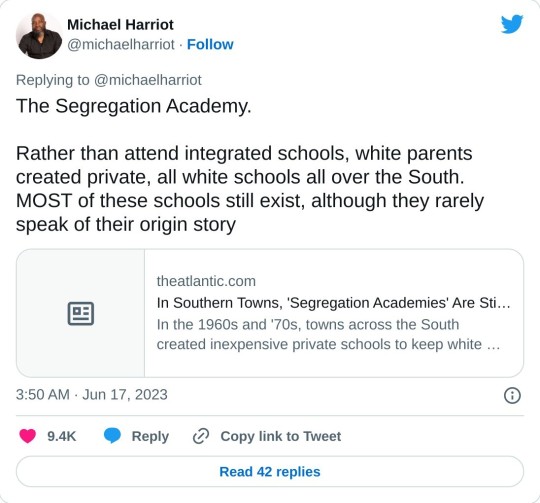
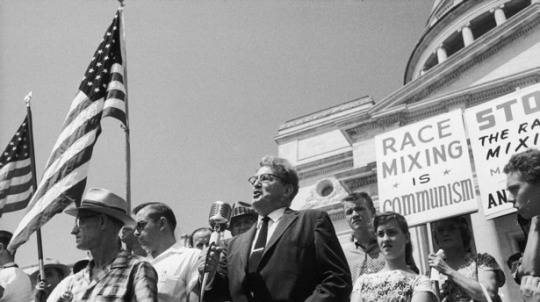
It took LaToysha Brown 13 years to realize how little interaction she had with white peers in her Mississippi Delta town: not at church, not at school, not at anywhere.
The realization dawned when she was in the seventh grade, studying the civil rights movement at an after-school program called the Sunflower County Freedom Project. It didn't bother her at first. By high school, however, Brown had started to wonder if separate could ever be equal. She attended a nearly all-black high school with dangerous sinkholes in the courtyard, spotty Internet access in the classrooms, and a shortage of textbooks all around. Brown had never been inside Indianola Academy, the private school most of the town's white teenagers attend. But she sensed that the students there had books they could take home and walkways free of sinkholes.
"The schools would achieve so much more if they would combine," said Brown, now age 17 and a junior.
But more than four decades after they were established, "segregation academies" in Mississippi towns like Indianola continue to define nearly every aspect of community life. Hundreds of these schools opened across the country in the 20 years after the Brown v. Board decision, particularly in southern states like Mississippi, Arkansas, Alabama, and Virginia. While an unknown number endure outside of Mississippi, the Delta remains their strongest bastion.
A Hechinger Report analysis of private school demographics (using data compiled on the National Center for Education Statistics website) found that more than 35 such academies survive in Mississippi, many of them in rural Delta communities like Indianola. Each of the schools was founded between 1964 and 1972 in response to anticipated or actual desegregation orders, and all of them enroll fewer than two percent black students. (The number of Mississippi "segregation academies" swells well above 35 if schools where the black enrollment is between three and 10 percent are counted.) At some of them -- including Benton Academy near Yazoo City and Carroll Academy near Greenwood -- not a single black student attended in 2010, according to the most recent data. Others, like Indianola Academy, have a small amount of diversity.
Recommended Reading
"These schools were started to keep white children away from blacks," said Wade Overstreet, a Mississippi native and the program coordinator at the national advocacy organization Parents for Public Schools. "They've done an amazing job of it."
It would be easy to see Indianola -- and Mississippi more generally -- as an anomaly when it comes to education: hyper-segregated, fraught with racial mistrust, stuck in the past. But in some respects, the story of education in Indianola is becoming the story of education in America.
As the Atlantic reported last week, throughout the country, public schools are nearly as segregated as they were in the late 1960s when Indianola Academy opened. In many areas, they are rapidly resegregating as federal desegregation orders end. White families continue to flee schools following large influxes of poor or minority students. And in Indianola, as in the rest of the country, there's stark disagreement as to why: Whites often cite concerns over school quality, while blacks are more likely to cite the persistence of racism.
Indeed, as Indianola struggles to make its way educationally and economically in the 21st century, the town's experience serves as a cautionary tale of how separate and unequal schools can not only divide a community, but fracture a place so deeply that its very existence is at stake.
Flight From Gentry
Indianola's tale of two school systems -- one public and black, one private and white -- began in January of 1970, when a U.S. district judge ruled that Indianola could no longer permit blatant segregation in its public school system. For years, white students had attended schools north of the train tracks that divide the town, while black students were relegated to inferior school buildings south of the tracks. The plan was to merge the schools and send all high school students -- white and black -- to the previously black Gentry High School.
In anticipation of the ruling, the white community founded Indianola Academy in 1965. But the fledgling school did not yet have a facility large enough to accommodate the hundreds of white students who left the public schools during Christmas break in 1969, knowing the decision was imminent, said Steve Rosenthal, a senior in high school at the time. Rosenthal said he was instructed to bring his textbooks home with him over break. When school started back up in January, he attended one of the academy's new satellite campuses in a Baptist church. The situation was far from ideal: Study halls sometimes were interrupted by weekday funerals. Yet not a single white student showed up at Gentry that semester. In the spring, Rosenthal received his diploma as part of the academy's first graduating class.
Today, Rosenthal serves as mayor of Indianola, a two-hour drive north of Jackson. The academy still thrives. According to the Private School Universe Survey, the school enrolled 434 white students and two black ones during the 2009-10 school year (the most recent year for which such data is available). Yet fewer than 20 percent of the town's approximately 10,000 residents are white.
Little else is publicly known about Indianola Academy apart from the information the school promulgates on its website. As a private school, its students do not have to take the state's standardized tests (much to the chagrin of the town's public school students), though a student handbook on the school's website states that students should score in the top 30 percent on a student achievement test to gain admission.
Sammy Henderson, the academy's headmaster, never responded to a reporter's request to visit while in town. But he did answer several questions via e-mail. Henderson wrote that African-American enrollment at the school has risen to nine students this school year, and "we also have Hispanic, Indian, and Oriental students." Annual tuition, which includes money for books and other fees, ranges from $3,795 to $5,080, depending on the grade level. And the academy budgets money annually for minority scholarships, spreading word about their availability via newspaper advertisements and word-of-mouth, Henderson said.
IRS tax forms filed by Indianola Academy show the school has raised a modest amount for scholarships in recent years. In 2010, for instance, the school paid out $6,500 for "minority scholarships," according to those forms.
Tradition and history partly explain why the scholarships aren't more widely utilized: Black families know their children could be isolated and shunned at the academy, and those with the means and desire to avoid the public schools have long relied on other -- more historically welcoming -- private schools, including a tiny, nearly all-black Christian academy in Indianola.
But Indianola Academy is also highly selective and opaque in its recruitment and admissions processes for African-Americans, according to public school students and teachers. Applicants have to be top students and submit multiple letters of recommendation, said a Sunflower County Freedom Project participant whose younger brother thought about applying. And some black students appear to be recruited at least partly because of their athletic abilities, said Sam Wallis, a current Gentry teacher, and Katie Cooney, a former one. Henderson denies that claim, writing that several of the academy's African-American students do not even play sports. He said a "minority scholarship committee" reviews the applications and awards money to those who "meet the qualifications," although he did not spell out what those qualifications are.
The academy, like other private schools, is eligible for federal money through what are known as Title programs that flow through public school districts. Indianola school district officials say the academy has received about $56,000 in Title II money for professional development over the last two years.
But apart from that exchange of money, there's little formal or informal interaction between the academy and the public school system, say Indianola residents.
Wallis, a New York native who attended public schools in Westchester County, expected to encounter segregation when he moved to Indianola in 2011 to teach in the public schools. But he had not anticipated such a laissez-faire attitude toward it.
"When I taught Plessy v. Ferguson, I offered it up that separate is not equal. I said it was one of the worst decisions in American history," he said. "But several of the students said, 'Why? That sounds okay.'"
Sinkholes and Low Scores
Compared to Indianola Academy, Gentry High School is an open book, its academic struggles exposed to the world. While there's some modest racial integration at Indianola's public elementary schools, by high school all but a few white students have departed. Ninety-eight percent of Gentry's students are black, one percent are Hispanic, and one percent are white. A plaque at the school's entrance states that Gentry was erected in 1952 as part of South Sunflower County's "special consolidated school district for colored."
The campus is made up of several worn buildings, which means that students have to walk outdoors between many of their classes. Since the outdoor drainage and sewage systems are outdated, sinkholes dot the walkways; when it rains, students and teachers can find themselves wading through foot-deep floodwaters.
Even Gentry's current students believe white county leaders deliberately built a partially outdoors campus 60 years ago, after a fire destroyed the previous school building, because they hoped it would deter black students from coming to school in the rain or cold. "They didn't want black kids to get an education," said Brown.
Gentry has struggled with test scores since the state's accountability system began in the 1990s: Last year, 56 percent of students at the school had passing scores in algebra, 51 percent in English, 42 percent in history, and 17 percent in biology.
But students like Brown believe the poor scores are at least partly because the school lacks the resources it needs to be successful. Students sometimes swelter in classrooms without working air-conditioning during the hottest months and they can shiver without enough heat during the coldest. In some classes, the teenagers cannot take textbooks home because teachers fear they will get lost. Computers crash constantly because of low bandwidth. In Wallis' first year at Gentry (2011-12), he inherited government textbooks identifying the latest U.S. president as George H.W. Bush.
"The school needs to be torn down and rebuilt altogether," says Brown.
Her classmate, 16-year-old Primus Apolonio, says poorly behaved students also keep Gentry down -- partly by scaring away the teachers. Of the six young instructors brought to Gentry in the fall of 2011 through the alternative recruitment program, Teach For America, Wallis was the only one to return for a second year. Others left for personal reasons, or because of frustration with the job, according to Gentry staff. Teach for America participants typically make two-year commitments to teach in a high-needs school.
"The students are disrespectful to the point where the teachers don't stay," said Apolonio. "And the school [administration] does not do anything but paddle them and send them back to class." (Corporal punishment has long been legally employed by Indianola's school district staff, as in other parts of the state. Earl Watkins, the "conservator" recently appointed by the state to oversee the school district, wrote in an e-mail that teachers have also been trained in other discipline strategies. "Because corporal punishment has been a practice for many years in the district, professional development must precede the reduction/phase-out of it," Watkins wrote.)
But Apolonio agrees with Brown that students would behave better if they felt like the community placed more value on their education. "During the winter it gets cold and the heaters don't work in the classrooms," he said. "Of course the kids are going to get more disruptive."
Gentry and Indianola Academy do not play each other in interscholastic sports; academies typically play other academies. Yet throughout most its history -- and for reasons that remain the subject of urban legend in town -- Indianola Academy has maintained control of a large football field adjacent to the old public junior high school (which now houses the district's early childhood center), on land town leaders say is actually privately owned by the American Legion. Instead of sharing the field, the academy leaders put their logo, IA, on the buildings like territorial markings. There's also a six-foot barbed wire fence around the field's perimeter: a stark reminder that outsiders should stay away.
Two Communities, Two Narratives
Indianola, like other segregated communities across the country, is defined not only by two school systems and two sides of town, but by two competing narratives that attempt to explain segregation's stubborn persistence.
According to one narrative, white leaders and residents starved the public schools of necessary resources after decamping for the academy, an institution perpetuated by racism. According to the opposing narrative, malfeasance and inept leadership contributed to the downfall of the public schools, whose continued failings keep the academy system alive.
Hury Minniefield is a purveyor of the former narrative. He was one of the first black students to integrate the town's public schools in 1967 through a voluntary -- and extremely limited -- desegregation program. He and his two younger brothers spent a single academic year at one of the town's white schools. "Because the blacks were so few in number, we didn't interfere with the white students too much and never did hear the 'n word' too much," he said.
Despite his unique personal history, Minniefield does not believe the schools in Indianola will ever truly integrate. "It has not been achieved and it will likely never be achieved," he said. "It's because of the mental resistance of Caucasians against integrating with blacks. ... Until the white race can see their former slaves as equals, it will not happen."
Steve Rosenthal, the mayor, takes a different view. He argues that many white families have no problem sending their children to school with black students, but choose Indianola Academy because the public schools are inferior. His two children, both in their 20s, graduated from the academy, where he believes they received a strong education. "I would not have had a problem sending them to public schools had the quality been what I wanted," he said, adding a few minutes later, "If there's mistrust, it's the black community toward the whites."
Rosenthal and Minniefield also have divergent views on what led to the public schools' decline.
The white community "would prefer not to pay a dime to the public schools," said Minniefield. "It's had a devastating effect on resources and the upward mobility of the community."
Rosenthal is not deaf to such arguments, agreeing that the Gentry campus should be updated or replaced. However, he cites mismanagement as well. When the state took over the schools in 2009, the district reportedly employed dozens of unnecessary employees, he says. "The old saying was that even the secretaries had secretaries," he said. "I don't think funding was our entire problem."
Students tend to offer the most nuanced perspective on why wholesale segregation endures. "It's because of both races," said Brown. "No one wants to break that boundary or cross that line. Both sides are afraid."
The Academies' Local Impact
The private academies scattered throughout the state have more in common than racial demographics and founding purpose. Many of them, like Indianola Academy, are located on their town's "Academy Drive" and embrace mascots that hearken back to the Civil War: the Generals, the Patriots, the Colonels. Their websites often prominently display non-discrimination clauses -- yet feature photos only of smiling white children.
The academies are also partly responsible for destroying the economic and educational fortunes of their communities, contends Dick Molpus, a former Mississippi secretary of state who co-founded Parents for Public Schools.
Those communities that continue to operate two separate school systems "are moving onto life support if they are not already dead," he said. "Companies don't want to come to places where both of the school systems are inferior." Molpus added that Mississippi towns have limited amounts of money, power, and influence. "When those three things are divided between black public schools and white academies, both offer substandard education," he said.
Richard Kahlenberg, a senior fellow at The Century Foundation and expert on school desegregation, said he's concerned that increasing numbers of poor, minority students will attend under-resourced schools nationally if segregation continues to deepen. Although research has uncovered blatant racial disparities in school spending, Kahlenberg defines school "resources" more broadly -- including teacher quality, parent involvement and peer college aspirations -- all of which he says tend to lag at schools with predominantly low-income, minority students.
'We Would Give Away Our Empty Buildings'
Rosenthal maintains that Indianola Academy, at least, offers a superior education. But he, too, is worried about the town's economic future. The schools aren't preparing enough students for living wage jobs, and the jobs aren't always there for those who need them. Indianola has lost several major businesses in recent decades, including the yard equipment manufacturer Modern Line and a large catfish processing plant. The town's population dropped by about 1,400, or 11.5 percent, between the 2000 and 2010 census. "We would give away our empty buildings to a company that would agree to employ x number of people," said Rosenthal.
Indianola's students say they need more than jobs to entice them to stay in a town that feels provincial in more ways than one. "Indianola is small to me," said Apolonio. "I would bring my family back here and show them where I grew up. But as far as living here? No."
Brown said the community has been taking small steps forward. Earlier this year the Sunflower Freedom Project published a literary magazine featuring the work of both public school and academy students -- an unprecedented collaborative effort. Hundreds of blacks now live north of the train tracks in previously all-white neighborhoods. And youth of different races meet regularly in recreational sports leagues, if not yet at formal interscholastic events.
Brown, however, would prefer to live in a town where the milestones are not so modest, the racial divide not so deep. "I do want to give back to this community," she said. "But if I start a family I do not want to start it here. We are so behind on everything -- especially education."
Jackie Mader contributed material to this report.
#In Southern Towns#'Segregation Academies' Are Still Going Strong#segregation academies#southern racism#segregation#nimrata haley
8 notes
·
View notes
Text
I kinda thought that would be the end of the flashback but we're still going.
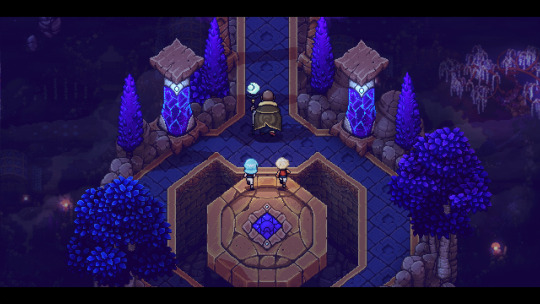
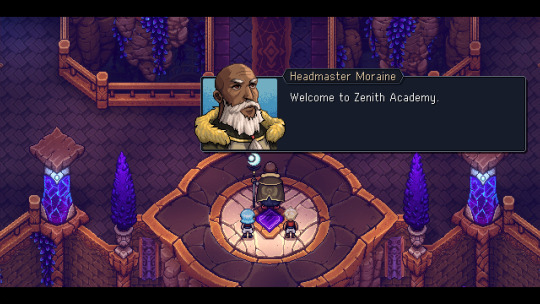
It's pretty. Love the floating castle effect. But, uh, are we going to be flashing back for much longer? The point of this flashback was to explain what happened with Garl, and that's done with.
If this goes on too long, I may have to file a formal complaint with the Archivist. He explicitly said that the story begins when Zale and Valere go to visit the Elder Mist. If the backstory is required reading then that's false advertising. The Archivist lied to me.
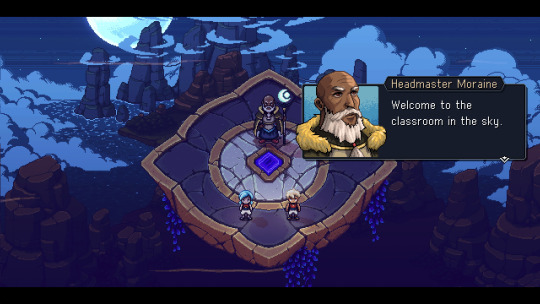
Oh man, this is such a cool safety violation. Do we have to educate children on a levitating stone diamond suspended a thousand feet in the air? This thing doesn't even have guardrails.
I don't think Headmaster Moraine cares much about student wellbeing.
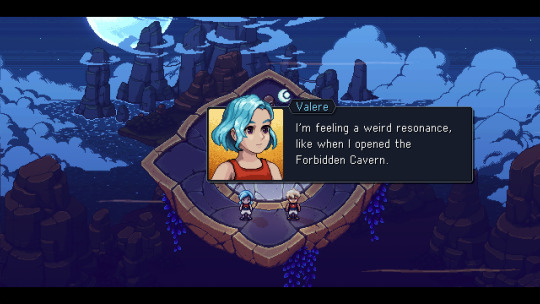
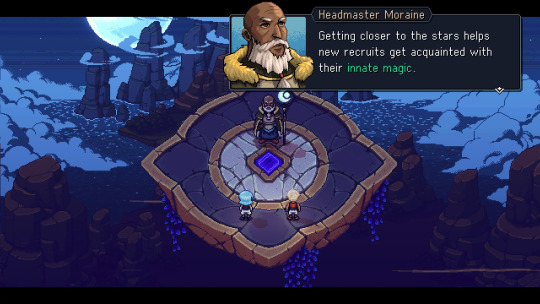
Okay. Y'know what? That does explain the altitude. The answer is yes, we do have to educate children on a levitating stone diamond suspended a thousand feet in the air.
But you're still not off the hook, Moraine. Guardrails. Do you know what the turbulence up here is like? Because it can do some unkind things to an 80 lb adolescent.
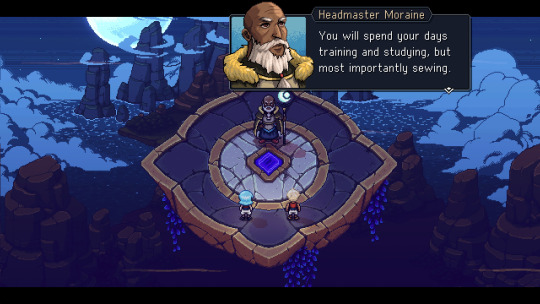
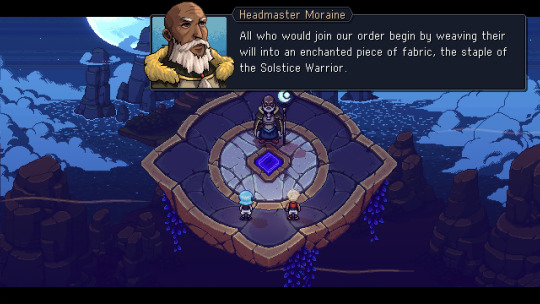
Zenith Academy doesn't hand out mass-produced uniforms like a lot of other Super Schools. You want to look freaking awesome, you stitch that yourself. A controversial policy but one that does ultimately allow for much more freedom of expression.
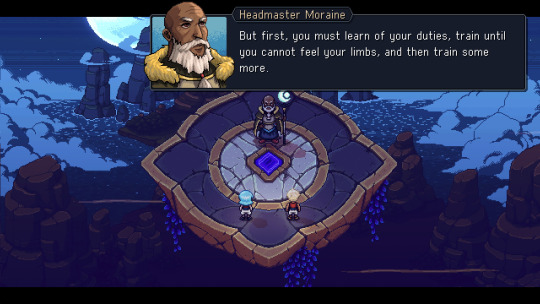
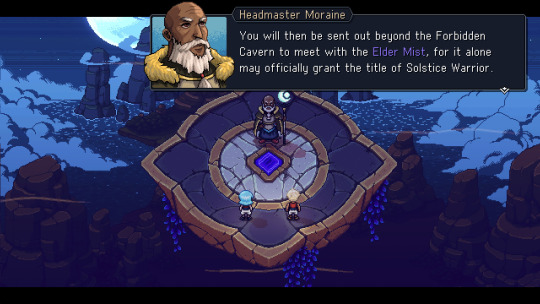
Okay, so a mysterious eldritch being is officially a part of the school's formal hierarchy, even outranking you. Man, school board meetings must be wild. In any case, I appreciate this knowledge. Now I know that you have a manager I can complain to about your general rudeness towards us.
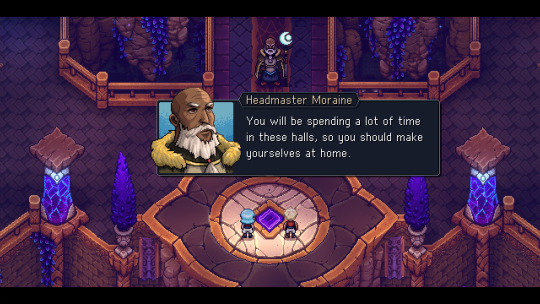
But I don't want to. I yearn for the present. Why are we still in the past?
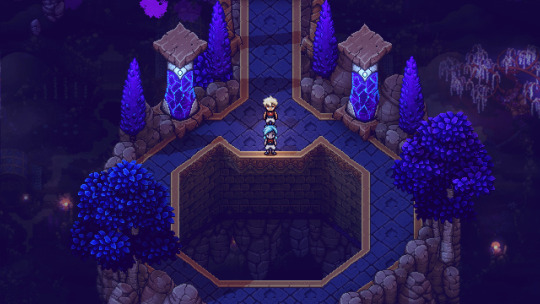
He sent the lift back down so I can't sneak out and go visit Garl. He's wise to my tricks. ~_~
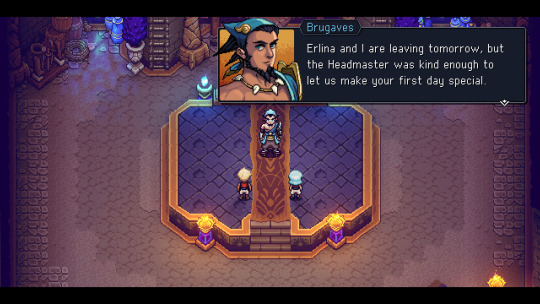
Please don't leave us alone with him. I'm pretty sure he hates us with every fiber of his being.
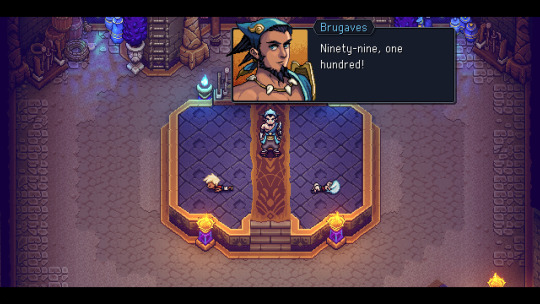
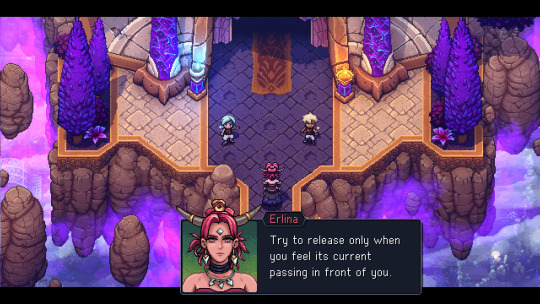
You know, this is all stuff I was perfectly content just assuming happened between the Garl blinding and where the Archivist said our story begins.
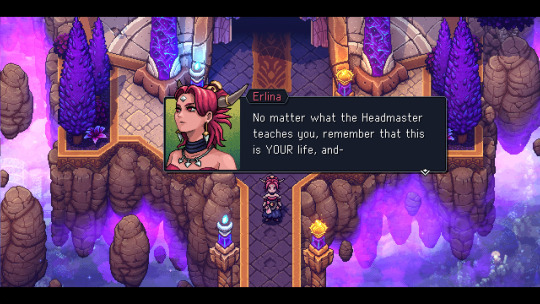
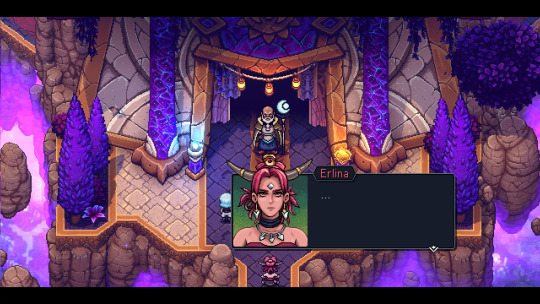
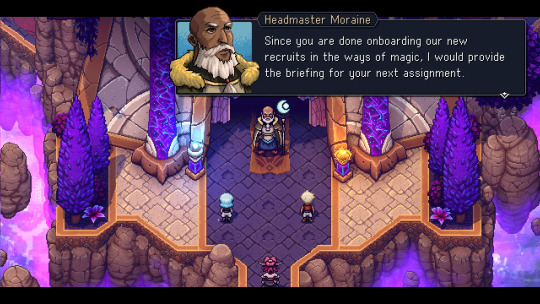
Ooo, spicy. Okay, you've got my interest again. Erlina has some shit to say about Moraine that she's biting her tongue on. That jives with earlier observations that he's a bit of a dick. Speaking in grandiose terms about our burden and how the normals should stay segregated from us, or we should stay segregated from them, or whatever.
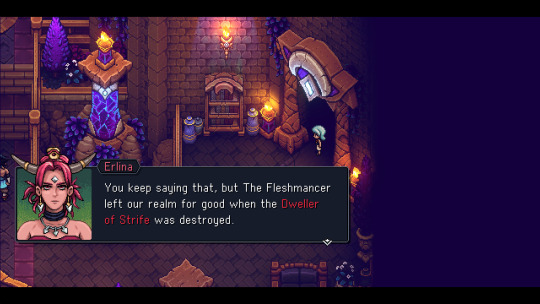
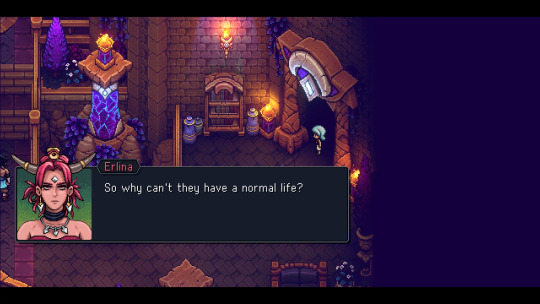
Wait, is that what the argument is about? Because the answer is, "Because they don't want one." Valere and Zale were chomping at the bit to begin their training. They paid for their admission with their friend's eye.
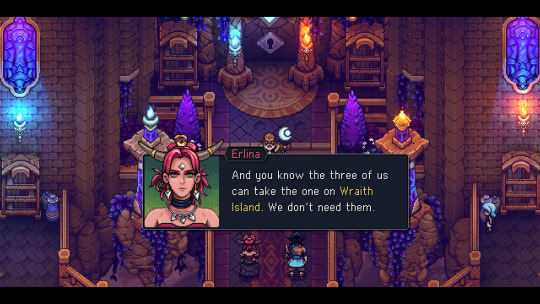
Okay but Moraine's like sixty years old. The older generation has to be replaced by the younger eventually. That's how time works.
I can't believe I'm saying this but I'm actually on Moraine's side here. If the job's important then you gotta teach some new kids to carry on when you can't anymore, and those two desperately want to be here. Eager volunteers are the best kind of recruits.
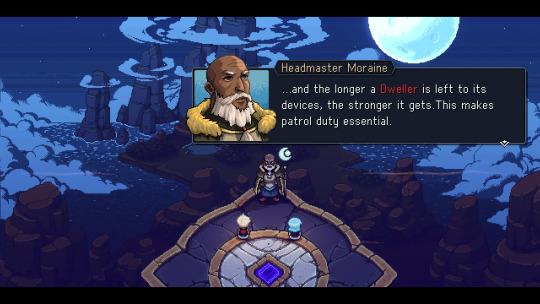
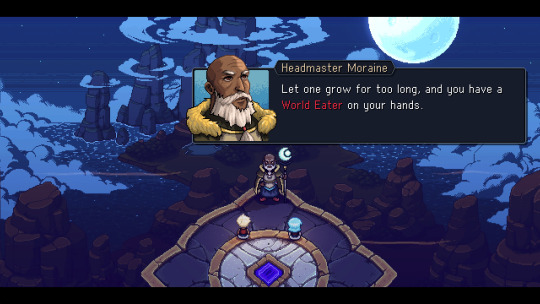
Okay, yeah, this definitely seems like a job that should remain well-staffed with fresh blood. If your responsibilities ever involve something called a "World Eater" then the fewer vacancies, the better.
I hope Solstice Warriors are well-compensated.
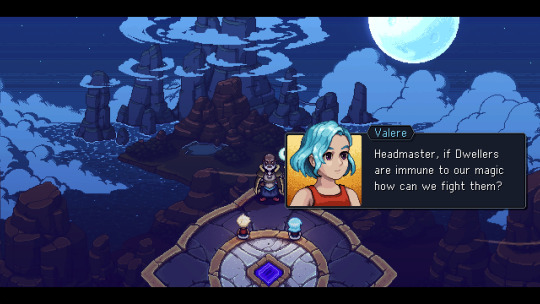
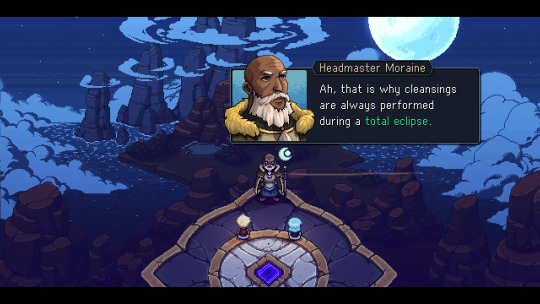

Cool. Cool. I'll try to remember that in the future when it matters.
*sigh* We started out so strong with naturalistic and organic dialogue, and now we're literally sitting in a classroom while a boring jackass reads straight exposition about world lore to our faces. This is the worst way to convey information.
8 notes
·
View notes
Text
Assorted thoughts in this year's Independent Spirit noms
First of all, super pumped for EEAAO and Emily the Criminal getting so much attention. EEAAO was easy to see coming, but I really thought Emily the Criminal might be slept on.
ANYWAY, the gender thing:
So, I love that the Independent Spirit Awards de-segregated the acting awards by gender, (and I'm partly aggravated but partly entertained by how butthurt some reactionary film nerds are about it) and it is 100% a positive thing. That said, the problem with abolishing this segregation everywhere is that generally, and certainly in the overall history of awards shows, it will result in fewer nominations and awards going to women. That's the very nature of the gender imbalance in Hollywood. So while it's important that things like this go away because A) nonbinary people need to be recognized and B) in a vacuum it's just kinda dumb to segregate awards by gender anyway and it took me until like last year to consider that, it's a difficult situation.
The point of this is to say that, thinking in a more cynical and pragmatic fashion, this was the absolute best year for an awards-giving body to make the transition (whether that was a factor in the decision or not), because this is a truly uncommonly strong year for female roles. Even past the limits of the Independent Spirit Awards, into the movies considered for the Oscars, I've never seen a year where Best Actress was more competitive than Best Actor. (It's almost as if Hollywood somehow foresaw that nobody was gonna beat Brendan Fraser for that award, so they just didn't try.) As is, 8 of the 10 nominees for Best Lead Performance are women. Granted, only 3 of the 10 nominees for Supporting are women, but that's still a female majority in nominees, which is exactly the start necessary for the first desegregated year.
Now, the question is how long is it going to take for other awards shows going to do the same thing? The Tonys will probably go first with the Emmys second, because Broadway and TV are going to see non-binary actors in those obvious, un-ignorable award-worthy kinds of roles before well the film industry does. (Ever since cable and even more so with streaming, TV has become far more progressive a platform in terms of representation than film.) The Tonys are also going to have an easier time transitioning to mixed categories because the gender balance on Broadway is better. For the others at least, will these transition years be likewise balanced enough to avoid bad press? Whether or not the Independent Spirit Awards did this, will they wait to see what the year's crop of films looks like before making that decision, in order to avoid said bad press? I would say that's most likely, but I think the "Is there a non-binary performance we can't ignore this year?" factor might play into it. If that is the case, that poor actor is going to be subjected to so much abuse by conservatives, and TERFS specifically, so I actually hope that isn't how it happens. The Oscars voters being older and more out-of-touch than other groups, even despite the changes made to Academy membership and voting privileges, I think they will fight tooth-and-nail to ignore non-binary performers for as long as they possibly can, so that probably won't be the thing anyway.
Those are my various thoughts on the subject.
#also some critics circles are going to do it before the Oscars too because there's less press and fewer voices involved#Independent Spirit Awards
0 notes
Text
Saving Private Ryan: Hollywood’s Who’s Who of White Male Actors Between 25- and 50-Years-Old from the 90s
After rewatching Saving Private Ryan (1998), I realize that there is a true parade of great actors that only Spielberg could have pulled together. The director likes to keep his movies historically accurate and the army was still segregated at the time, so it would have been predominantly white male soldiers that landed on the beach at D-Day*. Due to the focus in the film, there was a casting call for actors who could play the part of a white soldier between 20 and 40. The result is extraordinary. I want to make a list and see if you can remember where each of these actors shows up:
*Let it be noted that there was an all black battalion that landed (the 320th Barrage Balloon Battalion) and I invite people to learn more about them at https://airandspace.si.edu/stories/editorial/protecting-beaches-balloons-d-day-and-320th-barrage-balloon-battalion
Tom Hanks: One of the main characters searching for the titular Private Ryan. Hanks was perhaps the biggest actor of the early 90s with Philadelphia, Apollo 13, Forrest Gump, and Toy Story. I had grown up with this man being a comedic actor so I was always shocked when he played a serious role. This movie wrecked me and it was largely due to the part of this man.
Matt Damon: Not going to spoil anything, but know that Damon’s character is important. Fresh off of Good Will Hunting (1997), this role basically cemented Matt Damon as part of the Hollywood elite. He would go on to be part of the rebooted Ocean’s franchise as will as the action drama Bourne trilogy. He is on the walk of fame and this role is part of the reason why.
Vin Diesel: This was actually a major acting breakthrough for Vin Diesel. He is part of one of the most intense scenes during the search for Private Ryan. Diesel had only been in his self produced movie, Strays, at this point. He actually became known for his tough voice, which was eventually used as the character of Riddick and in the Fast and Furious films. Diesel is now considered one of the sexiest men alive and a major theatrical draw.
Edward Burns: Another actor that had only done personal projects before this film, Burns had written, directed, and starred in The Brothers McMullen (1995) and She’s The One (1996). Burns was actually accused of selling out somewhat since he was known more for his independent projects. He continued to act in romance roles as well as make indie films.
Tom Sizemore: Well...although Mr. Sizemore does a good job playing a “tough” in films like Born on the Fourth of July, Heat, Black Hawk Down, and Pearl Harbor, it has become apparent that he will take just about any role offered to him. He has since played in some of the most horrible films I have ever seen. It has also become apparent that he had substance abuse problems and was accused of domestic abuse. Back in the 90s, however, he was the man to call to play a tough as nails soldier.
Giovanni Ribisi: Never really a leading man, Ribisi was perfect for an ensemble cast. The characters he plays tend to either be dumb or sneaky while pretending to be dumb. What can I say, he has a certain look and sound that translates to “unintelligent.” American audiences knew him from TV shows Friends and My Two Dads as bumbling. His role in Saving Private Ryan was exactly what I expected as well.
Ted Danson: This one came out of nowhere. Danson had played Sam on Cheers in the 80s and was dealing with some issues in the 90s. He had cheated on his wife with Whoopi Goldberg and then done a strange movie promotion for Made in America where he dressed up in black face. He was actually not very popular in the late 90s and this was a first step (being part of a widely recognized ensemble cast) to getting back into Hollywood’s good graces.
Nathan Fillion: Since this is Tumblr, I probably don’t need to tell who this is, but I generally have to explain a little background in real life. Fillion is a nerd culture icon due to his role in the show Firefly and the film Serenity. He was also in perhaps the greatest internet series, Dr. Horrible’s Sing Along Blog, of all time. His small and rather funny part in Saving Private Ryan was really his big break since he had only been known for a role in the soap opera One Life to Live until that time.
Paul Giamatti: One of my favorite actors from his roles in Sideways, American Splendor, Cinderella Man and 12 Years A Slave, Giamatti had pretty much done small character roles before Saving Private Ryan. Thinking about it, this was a small character role as well. But after this he went on to be an Academy Award nominated and Golden Globe and Emmy Award winning actor.
Adam Goldberg: More of an all around artist, Goldberg is a character actor, filmmaker, musician, and photographer. He plays a slick talking soldier that gets into the absolute worst situation in a scene that I sincerely cannot watch. Well, I have seen it but generally find myself busily looking elsewhere on my last couple of watches.
Barry Pepper: This man is a very interesting actor for me because he has been in some of my favorite movies (The Green Mile, Saving Private Ryan, We Were Soldiers, and True Grit). He has also been in some of the worst movies ever made including Battlefield Earth, Seven Pounds, and The Lone Ranger. He plays a very interesting religious sniper and he seriously rains down the pain from above. Pepper’s good roles outweigh his bad ones (and his role in Battlefield Earth is hilarious) and this movie is great.
Bryan Cranston: This was back when Cranston was just an unknown character actor, long before he was Walter White on Breaking Bad and even before he was Hal on Malcolm in the Middle. He shows up at the very beginning for about 30 seconds and was cast more for his authoritative voice than his acting chops.
This is truly an ensemble cast since there really could be no lead. The follow up show called Band of Brothers really focuses on the idea that these soldiers all had to be strong and any weak link could result in extensive casualties. Saving Private Ryan is an intense film with many powerful roles. I talked to my mom after she watched with my dad and she really emphasized that it was a good movie. I agree with her completely.
#ensemble cast#war film#saving private ryan#matt damon'#bryan cranston#paul giamatti#tom hanks#nathan fillion#90s movies#introvert#introverts
19 notes
·
View notes
Text
Imagine (based on the incomplete fanfic Son of the Underworld) (4/5) (Son of Hades! Percy AU)
Before you read it, check the masterpost - I continue into HOO. Check the warnings before proceeding :)) Good reading!
Percy stalls to see his father while he can. He doesn't want to see other demigods nor his mother until he is better. Until he can protect them. He won't see any of them die because of the gods again. But his father hurt him. So he stalls.
Eventually, he wanders to Persephone's garden. Ripe pomegranates tempt him, and he just wants to lay his head upon the soft grass and stay.
There's where the goddess of Spring finds him: basking in the beauty of her garden.
She smiles. That's not only her husband's bastard: that's Sally's son. And while Hades loved the woman, like he loved many, Kore adored her.
She wasn't Persephone or Proserpina with Sally. There was no destruction in their love. Kore smiles, and she remembers the fields of flowers they walked together.
Then, Perseus wakes up, and she is Persephone again. Kore is her past, her innocence that she gave up willingly when she followed her husband to the darkness.
"Lady Persephone" It's the first time he treats a god with true respect.
Persephone hesitates. He has green eyes - he is Hades' son but he is her champion, the closest she can have to a son after her mother cursed her with barrenness.
Perseus smiles.
"Call me Kore"
"My name is Kore, and I bring the spring"
They walk together. Plants turn to look at them, but Perseus doesn't leave a trail of death in his wake. He isn't his father. He is not a destroyer - he is a protector.
She talks to him. About the blessing she put on him, about the flowers she plants in her garden, about her childhood.
He talks back. He tells her about Sally, about the hobbit hole. Perseus tells her how he doesn't belong anywhere.
Kore shows him Gabe's statue. She kisses his forehead, and tells him he doesn't need to fear her touch - he can't hurt her.
They stick together for two weeks before crossing paths with Hades. The Underworld is vast, and Kore had many gardens to show him.
Stepmother and stepson walk barefoot and bare-chested throughout the trails of stone and grass and sleep under the shade of trees, the part of the land of the dead that was now full of life.
Kore shows him how to weave crowns of flowers and how to grow vines under his feet. She teaches him patience, and the flowers glow in his presence.
Persephone teaches him how to make the soil sing. She teaches him control, and the earth purrs under their fingertips.
Proserpina trains him to make the shadows obey. She teaches him resilience, and the darkness is his to command.
They go to the palace together, hand in hand. Percy doesn't question her many facades - he adapts to it. To her skin being green or brown or black, to her ever-changing eye color, to her hair made of vines.
He doesn't dare voice it - but he thinks her more beautiful than Aphrodite.
Perseus is happy here. He leaves his human clothes behind - there's no need for them - and put on togas and chitons.
He stands tall before his father, and the god apologizes with an ax made of stygian iron. Hades says it's a prize for his last three successful quests.
He doesn't let the grudge go, but accepts the bribe anyways.
They dine together. Perseus loves it here - but eventually, he has to go back to his mother and his human life.
His school has one more week of break, and he is spending it with his father. Persephone, Kore, and Proserpina taught him much - but only his father can hone him.
It's against the old laws for godly parents to spend time with their children - Hades is in his own dominion and he doesn't give a damn.
Hades teach him how to call for the Underworld. Teaches him how to curve metal around his arms like water, and teaches him politics the best he can in a week.
Perseus goes back home. He soothes his mother - who, swarmed by calls of Annabeth and Thalia and Chiron, is too worried - and tells her to not visit this year - he'll come home by himself at least once a month and will be spending the rest of his time in the Underworld.
He pleads for her to not tell anyone. Percy needs space.
Sally understands, kisses the crown of his head, and tells him to be safe. He bundles himself up in sweaters instead of togas, and go back to Yancy.
His grades continue to be awesome in Math and awful in English. He keeps getting tutored - and when he gets a B- in Language Arts, it's enough to boost his GPA for the scholarship in Phillip's Academy.
He goes back to the Underworld every weekend. Ghosts teach him how to kill best with his hammer and ax, and some say he would do better with a shield instead of with double weapons, but he doesn't care.
Percy gets muscle - he is a soon to be fourteen years old, and his godly blood helps. He fills his sweaters now, and his new roommate tells him that he looks like a bodyguard. A wall of intimidation - Perseus likes it.
He perfects shadow travel. He gets tired if he goes further than his mother's house and back, and more than one person is still a little off, but he is getting there. Blackjack helps a lot - he is like a shadow charger.
He bends metal and he tries to summon green fire - he only gets sparks, but it's okay - he'll get there.
He uses more white and stronger shades of green and blue - they remind him of Persephone.
Once, he takes his mom to see his stepmom - it's teary, and they spend the whole evening in each other's arms, talking. Mom tells him this goodbye is for real - she tells him she met someone new, and he rejoices.
He starts to differentiate Persephone from Kore and Proserpina - and they are all amazing in their own right.
He takes his finals earlier because of the scholarship. Percy finally says goodbye to Yancy Academy.
This summer, he doesn't go back to Camp - he has no reason to. Everyone is fine, he is not having nightmares, there have been no monster sightings nearby.
He spends half his time in the Underworld. The other half, he spends with Luke.
After two years of taking care of half his friends, it's time to care for the other side.
He doesn't meet Kronos - he doesn't want a master - but he sits down in San Francisco with Luke and Ethan and Alabaster, and they ignore the war that rages around them.
Ethan and Alabaster are dating - Percy is happy for them. They look at him and Luke, and they know Percy loves him.
But Luke is twenty to Percy's fourteen, and he tells himself it's just infatuation, a teacher's crush.
Percy bakes with his Mom and walks Blackjack, and spends most of his weeks with Persephone in new gardens everywhere - it's summer, her time with her mother - but his Tuesdays and Thursdays are reserved for his friends.
Luke asks him only once if he'll join them. Percy says someone has to protect Annabeth, and Luke is clearly incapable of doing it. They don't talk about it again.
Soon, it's September. He takes a road trip with his newly graduated Mom to see the school - and learns that his mother's new beau is a teacher named Paola Blofis.
In the freshman introduction he meets her - Rachel Elizabeth Dare. She sticks to him like glue.
She is a fiery little girl, and Perseus had crushes before - Annabeth, Luke - but he has never been flustered. It's funny for Rachel, seeing the solid wall of sophomore muscles in her front stutter like a middle schooler.
They become friends. He explains the vision to her - she barely believes him, until one day they're out on town and Percy has to kill three empousai. Blackjack shows - and Rachel makes fast friends with the hellhound.
He moves in with a boy named Matt Sloan, and they don't talk at all - they have their own space, and don't ask questions.
Percy keeps visiting the Underworld. He tries to keep contact with Luke - but the boy gets erratic and his humor floats between exhilaration and blind rage.
When Luke punches him in the face two months into the school year after he denies knowing where Annabeth lives, he says his goodbyes to Ethan and Alabaster and leaves.
Perseus worries for Rachel. She is fiery and strong - but she is not a fighter. He teaches her how to stab with a dagger - he has no idea if Celestial Bronze works for her, but the Minotaur horn should.
He is the only black freshman in the whole Academy.
But people don't mess with him nor with Rachel. Percy looks like he could break someone in half like a twig, he disappears for a number of hours for who knows where he is a math genius even though he barely studies. He was involved with shady things three years ago. He barely talks with anyone but the strange girl - and never smiles in public.
Racist people call him a thug and drug trafficker. Persephone gives him a very realistic cherry earring - and rumors grow.
Perseus has to deal with much worse. So he keeps his facade, and sits with the other people of color of this place: It's segregation all over again, and Rachel is the only one who ever approaches them.
And the fact there's only fifteen people of color in the whole Academy? It says a lot about this country.
There are three black boys (including him), four black girls, two desi girls, three boys of oriental descent (mixed Japanese, Korean and Chinese), one Native-American boy and two Latinos, one with a black mom and a Cuban dad and another with all grandparents from French Guyana.
Most of them have scholarships, and just some of the girls interact with the white people - and he with his constant redhead attachment - racism is in an all-time high for such a northern state.
Percy starts paying attention in other minorities - and is not surprised when he finds almost nothing in this nazi paradise. If there's anyone anything other than cis straight, they're in the closet.
He rarely sees any of the girls in the pants version of the uniform if it's not for sports. There are one or two rebels - but it's mostly emo rich kids with no significant problems.
Rachel tells him she's not sure if she likes boys or girls. Six months into their friendship, they kiss - It's weird and wet. They try again - it gets better.
Rachel is still not sure if she likes anything at all. Everyone thinks they're dating - they don't deny it.
Most of them are catholic or protestant, Jewish people live in silence, and there's not one Muslim person in this whole school.
It's 2007, but it feels like 1940. Percy is fourteen - fifteen next August - but he feels like a hundred.
He meets Demeter in the Underworld twice. He is not impressed, and really happy they didn't cross during summertime.
Demeter is like most gods, a super-powered being throwing a tantrum. She is not happy that Hades married her daughter - even though it has been a thousand years and she cursed their marriage with barrenness. She looks at Perseus once - and force-feeds cereal to him.
He hates cereal.
But she doesn't tell any of the other gods Perseus and his father are meeting - so props for her.
He ignores any Iris Messaging that doesn't come from Persephone or Hades. He has no idea what's happening with the war - and right now, he doesn't care.
Perseus receives two calls from Yancy saying that weird people were there, after him - he doesn't care.
He isn't having visions - so everyone is just fine. They'll deal.
His powers grow. Hellish fire, earth, stone, skeletons, metal, gems, shadows - he does it all. Some better than others, and he is always tired, but he is managing.
Rachel and he grow closer and closer. She meets Persephone once. He hasn't heard from Camp in a year and a half now. It's been six months since he talked to Luke.
Persephone and Rachel start weaning him off the gloves. He still uses his sweaters, but his hands are freer now. He has control, and his touch isn't poisonous - he isn't a bringer of death.
Percy has a vision of Luke talking to Kronos about preparing his body and the Labyrinth. He can't lose Luke for an all-powerful being.
A month before his finals, he finds the entrance to the Labyrinth. Persephone tells him about Ariadne - but he can't risk Rachel with Luke. Luke is unstable, he might kill her.
He passes all his classes. Some with A+, some with C-, but it's okay. He'll be on AP Maths next year. It's going to be just fine.
Perseus goes home - he hugs his mother, eats some cookies, packs a bag and goes to the Labyrinth - if anyone can navigate it, it's him - Percy Jackson, son of Hades.
He wanders. Perseus passes by Alcatraz - and there's nothing he hates more than people who can do something and do nothing, and he isn't powerful enough to free Briares alone. So he goes back to the Labyrinth.
Perseus meets Hermes. He has no idea what the god is trying to do. He pleads for Percy to save Luke, he tells him he'll find help in the way, and points him the direction to a place connected to the Titan's war effort.
He pays Geryon a lot of money. Perseus knows he is being double-crossed, but whatever - he has a Stygian Iron ax, a Warhammer, could win in a wrestling match against Eurytion - probably - and has a giant hellhound at his beck and call.
Perseus asks about Luke. They tell him what they can - or else, the basic of the basic. He learns Luke has an army, that he is marching to CHB and that he is recruiting.
Percy lies - he says he is after Luke to join him. No one doubts him - not Geryon, not Eurytion, not some of Luke's minions who are loitering there - after all, he is lying low since December of 2006 - and it's summer of 2008. He is fifteen in August - he was thirteen and a half when he left.
No one knows that he hasn't talked with Luke since November of 2007, except Ethan and Alabaster. And they're not here, so it doesn't matter.
Perseus is not vain - but he is a child of the Big Three, the oldest mortal one. He is realistic: They know who he is. They keep tabs on him.
He is in Triple G Ranch for two weeks - still trying to pry where the hell is Luke - when Annabeth, Nico, Grover, and a freaking cyclops appear from the same entrance he did.
Percy is not there when they come out - he is talking to a son of Morpheus about Alabaster.
He is having lunch - Sun Cows hamburgers, because he really couldn't care less - when Eurytion brings them in.
They don't recognize him at first - he has his back turned to them, he is taller and larger, his gloves are gone, and his hair is fuller. Persephone says he looks a lot like his father now.
"Long time, no see," He thinks Annabeth is going to punch him. She comes to hug him - but it's been a long time, and he is not ready for it yet, so she just sits near him.
She tells him that they looked everywhere for him, that their hope lied on Grover's empathy bond, that Percy didn't even know existed. Nico doesn't look at him - Perseus thinks he still blames him for Bianca's death.
Percy doesn't trust the cyclops. They tell him Tyson - because the monster has a name - is Thalia's brother. He can't judge much, because he has a hellhound, but he does it anyway.
And the fact that most cyclops answer to Poseidon? Explains a lot.
Grover is the one to kill Geryon this time - they don't clean any stables. Annabeth pleads Percy to come with them since they have the same mission.
Oh, how he missed the way she assumes.
"I'm not after Daedalus Workshop"
And she just keeps on assuming. She can't blame her - it's her mother's curse.
"Luke is alive" She tells him.
"I know, I'm here for him" It feels like a betrayal, but he lets them think what they will think.
Nico tries. It's cute - Percy thinks - how he starts by saying he doesn't blame Percy, and that the Camp misses him, but a second later is using his sister to try and guilt him into complying.
Grover asks him how could he, after everything Luke has done.
"He is my friend"
"So was I"
They think he is going to join Luke - he doesn't disagree. They barely know him anymore.
And he loves them, but Luke needs him.
They go back to the Labyrinth. Percy does too - alone. He follows a group of demigods to Antaeus' arena.
Luke isn't Luke anymore, not where it matters. He welcomes Percy with open arms - but he isn't the Luke that Percy loves.
He says that he has to prove himself. The son of Hermes caresses his cheek and calls him Perseus - Percy hates him.
Ethan and Alabaster are there too. They are never together - Ethan tells him he is afraid the monsters will discover they matter to each other.
Luke Castellan - Lucas Castellan, one of his oldest friends, his first mentor, his first love - makes him fight for his life. Against monsters, like the gods that he fights against do.
And Percy does. Percy kills cyclops, dracaenas, empousai, hellhounds - anything Luke throws at him. He is tired when he meets Annabeth again - her little quest has fallen into their hands.
Luke pits them against each other - and Percy hates him. Something festers inside him - this time, it's not guilt.
Annabeth cuts him - but he doesn't care. He wins quickly enough - and instead of killing her, helps the four of them escape.
"Why did you do it?!"
"I thought I could save him" He confides in her.
They sit somewhere in the mess that is the Labyrinth, and they talk. He tells her about the Underworld and Rachel - somehow avoiding any details about the nature of their relationship - and she tells him about Chris Rodriguez and Tyson, and he still doesn't like the cyclops - but what can he do.
Nico apologizes, but Percy's heart was made for holding grudges, and Nico's throat was full of pride. It doesn't seem like conciliation - but it feels like a start.
Nico tells him about Lotus Hotel. Tells him that he discovered that Hera killed his mother in 1942 - and Zeus hid him and Bianca from her ever since. He talks about meeting her in the Labyrinth - and the way he hates Hera but doesn't blame Percy anymore for Bianca - his sister made her own choices.
Annabeth says they have an automaton that can take them to Hephaestus Forge, but they were unable to follow it. She tells him that they need his help to navigate the Labyrinth.
He can only do so much. They go in circles for a while before they reach the Forge, and then they separate - Grover and Tyson go one way; Nico, Annabeth, and Percy go to Mt. Etna.
Everything goes the same - Percy is mildly resistant to flames - he has his own. The telekhines try to kill them.
Percy feels it in his gut - the strength of this mountain, the earth beneath him. He sends Annabeth and Nico away.
Annabeth kisses him. It's weird - he doesn't have anything with Rachel, not for real, and he has been tong-tied around Annabeth for a long time now - but it's still weird. He has just lost any hope on Luke, they're about to die, it's a very adrenaline-fueled situation.
Nico looks strangely forlorn, he notices, as the two of them leave. It's weird because they barely know each other and every single one of their interactions is filled with resentment.
He doesn't have time to think about it. Percy gives them fifteen minutes - and then the world explodes around him.
Being dead never hurt so much. He wakes up for a second - and there's a beautiful girl there. Oh, Persephone must be visiting him in Elysium.
He wakes up again - that girl is not Persephone. She tells him to rest - and rest he does.
Perseus wakes up in Ogygia. The first thing he notices is that his chest is almost bare - the only thing covering him at all is a loose chiton.
He panics until the girl touches him softly and tells him she is immortal - he can't hurt her. She tells him her name, and she tells him she can feel death in him - but also life.
He knows the story - he knows Calypso.
Calypso is a Titaness. She touches and touches and touches him - they roll in the soft grass and they play on the mud like kids.
Their connection is above Annabeth, Rachel, Grover, Charles, Clarisse, Connor - these are his friends, no matter how much time has passed, but he didn't trust him with touch - he thinks he should start to.
It's above Ethan, Alabaster, and Luke - these are also his friends, even if they betrayed him. It pains him to think of them, even if he understands somehow their motives.
Calypso teaches him to trust. It's a very difficult thing to teach to a son of Hades, but he is more open now - there are still grudges pressing at his heart, but he trusts now.
Hephaestus come, and he can't stay. He loves Calypso (although not in a romantic way), and he has stayed for a month.
She gives him moonshade and kisses his forehead. He can't take her now - but he'll be back for her, gods be damned.
He doesn't bother to cover up when he takes the raft - Perseus still hates the ocean, by the way.
Percy shows up at Camp Half-Blood with no sweaters, no gloves, no barriers. He knows which side of the war he is on, and it's time for him to trust.
Camp is empty. He sees smoke curling out of the amphitheater - and Perseus walks to it. It's a bit earlier for a bonfire, did someone die?
He fears it was Annabeth or Nico. Or both. Percy runs to the amphitheater.
There's a black burial shroud. Something is warm at the bottom of his stomach.
Nico is crying on Will Solace's shoulder. Clarisse and Connor are holding hands. Annabeth is sobbing. Charles is hugging her - and finishing a eulogy for him. Percy is in the door, semi-naked, and really confused.
"He was my mentee and an amazing friend to all of those who knew him. He was-" Charles doesn't finish it.
"Don't bother with my presence, continue please" And Percy chooses this moment to be cheeky.
Everyone gapes at him for a second. He is almost Charles height, he is as muscular as Clarisse, he is wearing only a chiton and his weapons. There's a flower crown in his head.
Then, he is tackled by a very furious Charles Beckendorf.
"TWO YEARS"
"NO PHONECALLS, NO LETTERS, NOT A GODDAMNED SMOKE SIGNAL"
"AND THEN YOU DIE"
"AND COME HERE WITH THAT CHEEK"
Percy has no sense of self-preservation.
"It was only a year and a half"
Clarisse punches his arm, and Connor slaps him upside the head. Nico looks like he is about to murder him.
"Where were you?" Asks Annabeth, but he just shakes his head. He is not ready to talk about Calypso.
Will Solace manhandles him to the infirmary - his touch still startles Percy. The boy didn't really talk with him since he was claimed, after the whole Golden Fleece situation.
The son of Apollo apologizes. Perseus is surprised it still hurts - but keeping grudges is his specialty.
People keep looking at his bare chest and the flower crown he doesn't get off the whole week he is in Camp. They tell him they didn't tell his mother - and for that, he is grateful.
They go back to the Labyrinth with Rachel, who looks really cool in gold. It's weird. It was pretty easy to convince her, but there's this tension between Annabeth, Rachel, and Nico that he doesn't care about right now, and doesn't want for it to inflict on his mission.
They're all teenagers - Nico is thirteen (or eighty, buy who is counting) and the rest of them are fourteen - Drama is expected, but not welcome.
He has no idea the reason for it either.
Perseus has his own drama going on - or at least, there's a lot of drama being directed at him - and he is still confused why.
Annabeth stole a kiss from him - big deal, if she didn't mention until now, he was not going to - and is now acting like a headless deer every time they talk.
He and Rachel kiss sometimes - but she said she was still confused about her sexuality. Percy researched a bit - he thinks she might be ace, but that's a realization she has to make herself.
Nico and he have a lot of bad blood between them and very few interactions to drawn upon. The boy is an oyster - but Percy thinks he might like Annabeth. He seems a little envious of Percy's arms - it's really strange the way he looks at them sometimes.
They get caught in Antaeus' arena again. This time, there's no chance they can escape - there's a dagger pressed very close to Rachel's throat.
Luke says his champion is back, full of mockery. Something rages inside of Percy - he hates the blonde, even if he also loves him more than he can explain.
Luke pits him against Ethan. Percy can't kill one of his best friends.
He does kill Antaeus though. The giant has a lot of power over the earth, but Percy sends him straight to the Underworld.
Perseus calls for Blackjack, Nico calls for his own hellhound (Perseus had no idea he had one), and then he shadow travels them as far as he can. They find Grover and Tyson - and Pan. Percy loves the feeling of life all around him this time because it reminds him of Persephone.
They eventually find Daedalus Workshop. Annabeth recognizes the man: she says he is Quintus, that his body is metal, that she has been dreaming about him.
Daedalus betrays them, the Workshop explodes, Rachel, Grover, Tyson, and Annabeth fly in mechanic wings. Nico flies without any help, and takes Percy with him - Percy thinks Zeus will be less prone to kill him if he is with his son.
He feels a little like a damsel in distress - and they have to land quickly, because Percy is twice Nico's weight, even if the boy says the wind drafts help.
Turns out Rachel is richer than Perseus' first thought. She basically clicks her fingers and they have a limo. It's weird, but he is grateful.
Percy kisses Rachel cheek and promises her that he'll call her if he survives - he knows her number by heart after a year of knowing her.
Annabeth and Nico keep being weird - he doesn't even try and understand anymore.
In the middle of battle preparations, he sends two Iris Messages - one for his mom, one for Persephone. They cry, but - for very different reasons - can't interfere.
Perseus thinks it's wrong the gods can't help with their battle. It's their war the demigods are fighting - this battle is in their name.
He uses his drachma in the bare privacy of the empty Cabin 11, the drachma, their drachma. He still has faith - the last summer, when they all held hands and walked in the suburbs of San Francisco, it's burning in his mind - in Luke, in his protection of other demigods. He wants to convince him that his enemies are the gods - CHB has only half-bloods, pawns, children.
The rainbow shows what it seems like a horror movie. Ethan pledges his loyalty to a golden sarcophagus. Luke isn't anywhere to be seen - and when he is, it's not Luke anymore. It's Kronos.
Kronos desecrated the body of his friend. Kronos took pieces of Ethan's and Alabaster's souls. Kronos is making children fight his battles, just like the gods. Kronos is going to kill his friends.
Percy knows, right there, that he has chosen the right side.
They draw their battle lines. Percy raises skeleton armies from all centuries and all sides - Clarisse helps. He gets extra happy when he raises his half-brother soldiers - and they have to answer to a black person.
The fist of Zeus opens - and hundreds of monsters come through. Percy is mounting Blackjack - the ground shakes and stone spikes kill the first round of empousai. People rally behind him.
Nico flies around, thunder brimming in his hands. Sometimes, a monster dies and there's no one there - it's either Annabeth or one of Hermes children able to run faster than the wind.
Tyson saves him from another cyclops - Percy thinks there's an exception for every rule.
Everyone on their side has earplugs made by Cabin 9 - they filter the dangerous sound waves the Apollo children are making. Dryads and naiads defend the forest together - The river nymphs protecting the trees from damage.
Both the Demeter's and the Dionysus' kids use vines to keep the monsters at bay - only a few can come at a time. The Aphrodite Cabin rallies together with the best strategy ever: The stronger lure the monsters with their mother's charm, and then make them turn around and impale themselves in the spears and daggers of those whose charms are weaker.
Not all undetermined children deserted - He sees Lou Ellen kill a monster with a burst of fire magic, most of her siblings right beside her. Clovis is half asleep - no monster can get within five meters of him without falling asleep.
Briares comes and fights alongside Tyson - and they kill Kampe. Grover screams - it's the worst thing Percy has ever felt, and he has seen his father's Helm.
The monsters flee. This time around they had more time to prepare - and more time to rally. Fewer people die. Some are inevitable: Castor is gone, killed by Ethan's hand - something in Percy is filled with guilt - If he had killed Ethan, Castor might be alive.
He would never be able to kill Ethan.
Lee Fletcher is not dead - but he is missing an arm now. He is in shock - but the Hephaestus Cabin is rallying around to build him one.
Quintus - Daedalus - is there. He should be dead - it's disgusting to be near him. Percy isn't good with the spirit/ghostly part of it - but he picks up the last of his energy and sends - banishes - Quintus to the Underworld.
Nico and Percy can now bond over having hellhounds - well, they could. But Percy is not staying. He just listened to the Prophecy. He still has one more year before he is sixteen, and he wants to live.
"You have a place in camp, you know" Nico says, but Perseus shakes his head.
"I have school"
Annabeth, Nico, Clarisse, everyone thinks he is joking. He is very much not. He stays for the burning of the shrouds, and leaves.
This summer, he was a leader. Perseus Jackson, son of Hades, it's the leader of Camp Half-Blood - and he'll lead them to victory when the time comes.
Until then, he has sophomore year, a summer road trip with Rachel, garden visits with Persephone, training with his father, and movie nights with his mom and Paola.
And, of course, now he has to come to Camp once a month so everyone knows he is alive. One would think you can't disappear for a year and a half without everyone on his ass about it.
His birthday is a blast. Charles, Connor, Nico, Annabeth, Grover, Tyson, Rachel, and even Travis, Will, Lou, and Silena are there.
Percy sees a hole that no one else does, one filled by Alabaster, Ethan and Calypso, and Luke - but he doesn't complain. Moonshade grows at his windowsill, and the others made their own choices.
Percy eats blue cake and wonders - Four years ago, he had no friends. Now, he has a dozen - a dozen people who care about him, who care about his well-being. A dozen people who touch him, because he doesn't have the plague.
He is a leader, and a friend, and a hero. And it's totally awesome.

#percy jackson#heroes of olympus#pjo#percy#percy jackon and the olympians#sally jackson#nicercy#jercy#eventually#fanfic#au#canon divergence#annabeth chase#charles beckendorf#connor stoll#clarisse la rue#nico di angelo#nico di angelo son of zeus#hades#persephone#percy jackson and the olympians#percy jackson son of hades#percabeth#lukercy#perachel#calypso#rachel elizabeth dare#perlypso#luke castellan#ethan nakamura
80 notes
·
View notes
Link
LETTERS FROM AN AMERICAN
On August 21, 1831, Nat Turner, an enslaved American, led about 70 of his enslaved and free Black neighbors in a rebellion to awaken his white neighbors to the inherent brutality of slaveholding and the dangers it presented to their own safety. Turner and his friends traveled from house to house in their neighborhood in Southampton County, Virginia, freeing enslaved people and murdering about 60 of the white men, women, and children they encountered. Their goal, Turner later told an interviewer, was “to carry terror and devastation wherever we went.”
State militia put down the rebellion in a couple of days, and both the legal system and white vigilantes killed at least 200 Black Virginians, many of whom were not involved in Turner’s bid to end enslavement. Turner himself was captured in October, tried in November, sentenced to death, and hanged.
But white Virginians, and white folks in neighboring southern states, remained frightened. Turner had been, in their minds, a well-treated, educated enslaved man, who knew his Bible well and seemed the very last sort of person they would have expected to revolt. And so they responded to the rebellion in two ways. They turned against the idea that enslavement was a bad thing, and instead began to argue that human enslavement was a positive good.
And states across the South passed laws making it a crime to teach enslaved Americans to read and write.
Denying enslaved Black Americans access to education exiled them from a place in the nation. The Framers had quite explicitly organized the United States not on the principles of religion or tradition, but rather on the principles of the Enlightenment: the idea that, by applying knowledge and reasoning to the natural world, men could figure out the best way to order society. Someone excluded from access to education could not participate in that national project. Instead, that person was read out of society, doomed to be controlled by leaders who marshaled religion and propaganda to defend their dominance.
In 1858, South Carolina Senator James Henry Hammond explained that society needed “a class to do the menial duties, to perform the drudgery of life. That is, a class requiring but a low order of intellect and but little skill.”
But when they organized in the 1850s to push back against the efforts of elite enslavers like Hammond to take over the national government, members of the fledgling Republican Party recognized the importance of education. In 1859, Illinois lawyer Abraham Lincoln explained that those who adhered to the “mud-sill” theory “assumed that labor and education are incompatible; and any practical combination of them impossible…. According to that theory, the education of laborers, is not only useless, but pernicious, and dangerous.”
Lincoln argued that workers were not simply drudges but rather were the heart of the economy. “The prudent, penniless beginner in the world, labors for wages awhile, saves a surplus with which to buy tools or land, for himself; then labors on his own account another while, and at length hires another new beginner to help him.” He tied the political vision of the Framers to this economic vision. In order to prosper, he argued, men needed “book-learning,” and he called for universal education. An educated community, he said, “will be alike independent of crowned-kings, money-kings, and land-kings.”
When they were in control of the federal government in the 1860s, Republicans passed the Land Grant College Act, funding public universities so that men without wealthy fathers might have access to higher education. In the aftermath of the Civil War, Republicans also tried to use the federal government to fund public schools for poor Black and white Americans, dividing money up according to illiteracy rates. But President Andrew Johnson vetoed that bill on the grounds that the federal government had no business protecting Black education; that process, he said, belonged to the states—which for the next century denied Black people equal access to schools, excluding them from full participation in American society and condemning them to menial labor.
Then, in 1954, after decades of pressure from Black and brown Americans for equal access to public schools, the Supreme Court under Chief Justice Earl Warren, a former Republican governor of California, unanimously agreed that separate schools were inherently unequal, and thus unconstitutional.
Immediately, white southerners lawmakers launched a campaign of what they called “massive resistance” to integration. Some Virginia counties closed their public schools. Others took funds from integrated public schools and used a grant system to redistribute those funds to segregated private schools. These segregation academies dovetailed neatly with Ronald Reagan’s rise to political power with a message that public employees had gotten too powerful and that public enterprises should be privatized.
After Reagan’s election, his Secretary of Education commissioned a study of the nation’s public schools, starting with the conviction that there was a "widespread public perception that something is seriously remiss in our educational system." The resulting report, titled “A Nation at Risk,” announced: “the educational foundations of our society are presently being eroded by a rising tide of mediocrity that threatens our very future as a Nation and a people.”
Although a later study commissioned in 1990 by the Secretary of Energy found the data in the original report did not support the report’s conclusions, Reagan nonetheless used it to justify school privatization. He vowed after the report’s release that he would: “continue to work in the months ahead for passage of tuition tax credits, vouchers, educational savings accounts, voluntary school prayer, and abolishing the Department of Education. Our agenda is to restore quality to education by increasing competition and by strengthening parental choice and local control.”
The drive to push tax dollars from public schools to private academies through a voucher system has remained a top priority for Movement Conservatives eager to dismantle the federal government, although a recent study from Wisconsin shows that vouchers do not actually save tax dollars, and scholars do not believe they help students achieve better outcomes than they would have in public schools.
Calling education a civil rights issue—as President Barack Obama had done when calling for more funding for schools—former president Trump asked Congress to fund “school choice for disadvantaged youth, including millions of African-American and Latino children. These families should be free to choose the public, private, charter, magnet, religious or home school that is right for them.” (In fact, most of those using vouchers are already enrolled in private schools.) His education secretary, Betsy DeVos, was a staunch supporter of school choice and the voucher system; she and her family gave $600,000 to promote school choice ballot laws in the decade before 2017.
The coronavirus pandemic sped up the push to defund public schools as Trump pushed hard to transfer funds from the closed public schools to private schools. In December 2020, he signed an executive order allowing states to use money from a federal anti-poverty program for vouchers, and as of mid-2021, at least 8 states had launched new voucher programs. A number of Republican governors are using federal funds from the bills designed to address the pandemic to push vouchers.
In 1831, lawmakers afraid of the equality that lies at the heart of our Declaration of Independence made sure Black Americans could not have equal access to education.
In 1971, when segregation academies were gaining ground, the achievement gap between white and Black 8th grade students in reading scores was 57 points. In 1988, the year of the nation’s highest level of school integration, that gap had fallen to 18 points. By 1992, it was back up to 30 points, and it has not dropped below 25 points since.
—-
Notes:
https://www.pbs.org/wgbh/aia/part3/3h500t.html
https://www.theatlantic.com/national/archive/2012/12/in-southern-towns-segregation-academies-are-still-going-strong/266207/
https://www.insidehighered.com/blogs/just-visiting/nation-risk-and-re-segregation-schools
https://progressive.org/magazine/private-school-vouchers-levin/
https://wisconsinexaminer.com/2021/05/07/tracking-the-growing-cost-to-taxpayers-of-private-school-vouchers/
https://abcnews.go.com/Politics/wireStory/governors-federal-virus-aid-expand-school-choice-79563407
https://www.news-herald.com/2021/08/08/ohio-public-schools-plan-lawsuit-to-challenge-edchoice-program/
https://www.azcentral.com/story/news/politics/arizona-education/2021/08/17/arizona-gov-doug-ducey-offers-incentives-reject-mask-mandates/8169357002/
https://www.courthousenews.com/devos-family-donated-600k-school-choice-ballot-efforts/
https://www.npr.org/sections/ed/2016/12/07/504451460/school-choice-101-what-it-is-how-it-works-and-does-it-work
https://www.npr.org/2017/02/28/516717981/watch-live-trump-addresses-joint-session-of-congress
https://edreform.com/wp-content/uploads/2013/02/A_Nation_At_Risk_1983.pdf
https://www.politico.com/news/2020/12/28/trump-private-schools-pandemic-451757
https://www.npr.org/sections/ed/2016/12/07/504451460/school-choice-101-what-it-is-how-it-works-and-does-it-work
https://www.insidehighered.com/blogs/just-visiting/nation-risk-and-re-segregation-schools
LETTERS FROM AN AMERICAN
HEATHER COX RICHARDSON
#history#slavery#education#the dismantling of the middle class in the USA#Reagan#Heather Cox Richardson#Letters From An American
3 notes
·
View notes
Text
As someone who has researched school segregation and interviewed hundreds of white parents, I know that one of the biggest barriers to achieving meaningful integration in public education is how the most politically powerful parents in any school system — usually many of the white parents — come to understand what the “good” schools are and what is “best” for their children.
As a former public school parent and a white woman with a white son who performs well on the metrics that get students into the most selective public schools, I know the peer pressure that white parents feel to get their children into these high-status schools. I remember another white parent, when she learned that my son was not going to the most selective, predominantly white middle school in our district, looking at me in disbelief and saying, “I thought he had high tests scores?”
Yes, he did have high test scores and, yes, he most likely would have been accepted to the selective middle school, which many of his friends’ parents were determined to get their children into. But he did not want to go to that school.
He thought the students there looked bored when he toured it. I did not want him to go there either, because he was a sensitive kid who needed a school with a strong sense of community and care, which that school lacked. We were both upset by the almost completely white student body in this selective school located in the center of a racially and ethnically diverse community school district.
Really, the only reason to send him there would have been because it would give him — and, by default, his parents — a sense of status and prestige. This school had the highest test scores in the district, my son noted, because it only accepted the students with the highest test scores. In his middle school mind, being selective in and of itself did not make a school “good.” He had higher standards for a school than that. Too bad more white parents do not see it that way.
New York City has become the poster child of intense racial segregation, but the issues here are not unique to the Big Apple, nor is the challenge of implementing solutions. The New York City Mayor’s School Diversity Advisory Group has released its preliminary report outlining next steps for the city’s Department of Education to lessen chronic racial and social-class segregation in the public schools. This Advisory Group, of which I am a member, laid out reachable goals to address equal access and resources, school accountability for diversity, and new teaching strategies to ensure that all students feel valued and affirmed.
One of the most pivotal factors in how far these recommendations can go in New York and elsewhere is the amount of support that such plans receive from public school parents. In particular, white parents too often say they want integration while simultaneously opting out of diverse schools in favor of those that are more selective, of higher status among their peers, and predominantly white and/or Asian.
Thus, as white parents navigate the shifting terrain of school choice and enrollment, they need to understand that having one’s child at the top of a rigid and segregated hierarchy of schools is not always the best parenting decision, on several levels. Taking a deep breath and paying less attention to what other white parents say and more attention to your children and their teachers will enable you to make choices that can not only better fit their learning styles, but also do more to make our public school system more integrated and better.
Cutting-edge research in brain science and education tells us that students learn better and deeper when their ways of knowing a topic are challenged by those who have different life experiences and worldviews. A recent report on learning by the National Academies of Sciences, Engineering, and Medicine demonstrates that the culture of our families and communities plays a major role in how we learn.
This means that in many instances there is not a single right or wrong way of understanding a concept or interpreting a work of literature. We understand things in slightly different ways because of our histories and backgrounds. Having your children exposed to these different ways of knowing prepares them for a world of cultural complexity and constant uncertainty.
Indeed, for the first 175 years of public education in the United States, the “right” answers to most questions have been normed around white and mostly northern European culture. In the last 30 years, we have codified these culturally specific ways of knowing in high-stakes standardized tests that Asian students also tend to perform well on, particularly in math.
Taking a deep breath and paying less attention to what other white parents say and more attention to your child and their teachers will enable you to make choices that can not only better fit their learning style, but also do more to make our public school system more integrated and better.
The result is that we consistently sort and select students based on their cultural histories, ways of knowing and prior opportunities to learn. This racial hierarchy becomes so ingrained that even when schools enrolling mostly black and Latino students have high test scores, we still see them as “bad” schools.
In fact, in a study we conducted on Long Island, we found that the race of the students in the school system affected property values of otherwise identical houses in districts with the same test score data by as much as $50,000. In other words, the perception of “good” schools is too often about the perception of race, even when black and Latino students perform well on tests normed toward white students.
And still, despite this evidence and the call for more integration, many white parents continue to derive status and honor from one another when their children are selected into predominantly white or Asian schools regardless of the climate or characteristics of these schools. As the viral video of a parent meeting on the Upper West Side of Manhattan last year demonstrated, white parents can become very angry when the admissions policies to these schools change.
Too often the parents live vicariously through their children, and thus feel “gifted” or elite themselves when their children are admitted to selective schools. But the fact is that children usually want to be in schools where they feel emotionally safe and cared for by the adults and other children at the same time that they are engaged and challenged to think more deeply about complex issues than the possible answers on a multiple-choice test. As the rich evidence in the National Academies Report demonstrates, students learn best in these settings, even if they’re not the schools with the highest test scores or the most white and affluent students. In fact, it’s the latter schools that often have high rates of anxiety, cheating, drug and alcohol abuse and bullying.
It can be difficult for some parents to choose a more nurturing school for their child if it does not confer status and approval from their family, friends and acquaintances. But until more white parents make those choices, the hierarchy and the racial segregation will remain. While the NYC Mayor’s Advisory Group’s sage advice to rate schools based on diversity as well as test scores is a solid first step to address these race-based perceptions of “good” schools, white parents must also listen to their children and their hearts before saying they support integration while choosing segregation.
1 note
·
View note
Text
The Umbrella Academy Season 2
7/10
I feel the same way about Season 2 as I feel about the last episode of Season 1. It’s incredibly entertaining. It’s very heartwarming at times. But it is so much flash and action and style and very little substance. When I actually look deeper at the storylines and the characters it feels a bit hollow. Either we skipped SEVERAL STEPS of character development to get here, or we didn’t move forward at all.
This would have been a FANTASTIC Season 3 IF we had gotten a Season 2 full of good character development only for Season 3 to show a character regression before moving forward at the end.
There were SO MANY storylines in Season 2 and so many characters did literally nothing, twiddling their thumbs while more important stuff was happening with other siblings. And that’s the whole crux of the matter. The siblings spent far too much time separated, their storylines disjointed.
Season 1 had a premise. Dysfunctional but found family. And the end of Season 1 promised that they would actually try to address Vanya’s (and their own) trauma. Season 2 sideswerved HARD and did not meet that promise. Instead they gave Vanya an amnesia storyline to gloss over the painful parts of healing.
There were just so many lost opportunities. More issues with this season and what I would have liked to have seen instead under the cut. I uh... went on a rant.
The Plot
What they essentially did was a soft reboot that just re-treaded out Season 1 with slight differences which is why so many of the characters feel so stagnated. Most of them are not moving forward or are moving forward so slowly, what was the point?
Luthor:
moderate character growth. He has (mostly) broken free of Reginald Hargeeves’ influence and transferred his daddy issues onto any other older male. The underground fighting and being a body man for Jack Ruby was fine but having FIVE become his new daddy figure and then trying to figure out WHICH FIVE to listen to was absolute gold. Also him being heartbroken but SUPER RESPECTFUL of Allison’s relationship with Raymond was A+. I assume he was just as respectful when she was married to Patrick and kudos to him for being the only one to mention Claire all season. Gets points taken off because despite the end of Season 1 being about how to help Vanya process her trauma his immediate reaction to Vanya is to CONFRONT HER WITH A GUN BEHIND HIS BACK which he only puts away when he sees there’s a child in the barn with them. And then he just... walks away.
Yeah he just… is there quietly supporting everyone else this season. Not the best but not the worst.
Diego:
SO MUCH CHARACTER GROWTH. I AM PROUD OF HIM. SOMEHOW JUMPED UP TO ONE OF THE FAVES THIS SEASON. Might have had the best character growth in the whole season. He went to therapy for 75 days and came out of it willing to throw away numbers and be team zero and make amends with most of his siblings. Still snarky and mean and kind of an obsessive dumbass about JFK and went into his thing with Lila way too quickly but I really loved him being a foil to Five. I almost cried when his stutter came back.
Ok but my biggest complaint is that I would have liked to see his own struggles as a hispanic man in 1960’s Dallas, Texas. Tie it to Allison’s Civil Rights plot. Because he and LiIa are two clearly non-white people, Lila with a British accent of all things, in 1963 Dallas going to a fancy gala with rich white men and no one bats an eye. No one says anything to either of them. Not that I want them to be discriminated against but it’s weird to see that juxtaposed with Allison not even being allowed to go into a diner. Because racism towards hispanic men is well and alive in present day Dallas and it sure as hell would have been in 1963. Dallas specifically used to have a neighborhood called Little Mexico that reached peak population in the 60s but was slowly dismantled by gentrification. While not legally segregated, Mexican-American citizens were still considered second class citizens. Places like Woolworth’s (and probably that diner where Allison had the sit in) did not allow Mexican-Americans. Him being put into that asylum was definitely rooted in racism after showing violence, even after helping an old white lady, and screaming about the president being assassinated.
I don’t know how to tie that cleanly to Allison’s storyline considering he already had a lot going on with his plot but like… show us some representation of a history not usually taught. Especially since David Castenada is Mexican-American. It’s literally his history.
Allison:
Started off kind of strong and then... eh. I liked PARTS of her storyline. I really liked her getting involved with the Civil Rights movement. I loved her being taken in by the other women at the hair salon. But I think the reveal of her storyline came too late. We spent multiple episodes with her before getting to her flashback after landing in the 60’s and it should have come earlier if you wanted us to care more about the community she joined.
While I liked Raymond fine, I would have preferred he didn’t exist. Not for shipping or anything but just for the fact that you had such a strong beginning with Allison being saved by this group of black women who took her in and defended her that I feel like you could have built more into that. They had some great scenes with them supporting her after Raymond is arrested and crying out as Allison is being restrained by the police officer but then Raymond is angry at her and denounces her from the community and then nothing. Even after she tells Raymond the truth there isn’t another scene with Allison and the other women.
Allison didn’t need another relationship, sincere or not. Not after Patrick and Luthor. She needed scenes with the women, commiserating over her lost family, siblings and child. She needed the support of other women in order to learn how to support other women so she could learn from her mistakes with Claire and Vanya. And to learn how to use her powers responsibly.
Her whole arc from Seasons 1 and 2 is about not wanting to use her powers because she has a history of personal gain and escalating violence… but then she doesn’t use them at moments where they would be the most helpful. How great would a storyline have been about her using her powers to protect these other black women in the community? And about learning how to use her powers to de-escalate a situation without resorting to violence? (Every time Allison was in a situation I kept screaming at the tv “I HEARD A RUMOR YOU SAT IN A CORNER AND TIED YOUR HANDS TOGETHER”)
Also. Also. Also. Black women often have no voice. Even, or especially, in their own community. They get looked over because of the violence happening to black men or the non-diverse feminism of white women. Show us more about Allison literally having no voice and connecting with these women who metaphorically have no voice. We get such a small taste of it. I want more.
Klaus:
What did Klaus do all season? No seriously? What was the point of him?
I get that the cult is a very Klaus thing to do but then he gets smothered by them so he tries to dip out? Was there… supposed to be a lesson in codependency there? A lesson about creating a new accepting family? About being heard by people who support you but he prefers the Hargreeves who will snipe at him instead?
And he was so mean to Ben all season. ALL SEASON he was mean to Ben. Because Ben can’t leave him and he’s acting as his conscience. Which is fair because that gets annoying after 17 years but maybe you should listen to him a little? Maybe you shouldn’t be making him perform tricks for you to impress your cult?
The Dave storyline was sad and some of the most real moments from Klaus all season. Another storyline that… we knew where it was gonna go and how it was gonna end but I didn’t mind it so much. But if the point of his storyline was to learn to let go of his trauma and just of people he’s grieving in general, Dave AND BEN, then… how does the cult fit into it? I’m still trying to make sense of the cult plot point. It didn’t serve anything with Klaus and you didn’t need it to have Ben have feelings for and try to make a connection with a girl. There’s something there with the cult storyline they were maybe trying to get at and I don’t think they achieved it.
Also his sobriety. The reason Klaus is the way he is is because he takes the drugs and the drinks to not see ghosts. If he were sober for three years (why was he sober for three years? He was in a cult. He should have been off his rocker the whole time because him trying to get sober was to see Dave and Dave han’ died yet) why wasn’t he surrounded by other ghosts asking him for help the same way they were in S1? And then he just… throws his sobriety away. Because of heartbreak? Annoyance at the world and at Ben?
Five:
Repetitive. It’s just a retool of S1’s apocalypse storyline. Which. AGAIN. Five doesn’t even solve this second apocalypse! I stand by Rapaccini’s post saying that Five was meant to be on the stage with the gun in his hand in season one. And he should have been there trying to stop the apocalypse with Vanya in S2. Cool, great, love Diego being taken into the Time Commission. But Five’s the one who’s been putting the pieces together and trying to get them the briefcase and who’s been looking at the newspapers and watching the videos and whatnot. How did no one consider that the second apocalypse revolved around Vanya? Again. And it’s for the same reason: her storyline was removed from her siblings and no one was there to support her until literally the last moment. She was being tortured by the FBI for A WHILE. Did anyone even tell Five that Vaya was being tortured by the FBI? Whie he was having a slap fight with his older younger self?
Old!YoungerFIve vs Young!OlderFive was hilarious. I loved every moment of it except for the fact that at literally the same time Vanya was being tortured by the FBI. Why are you keeping FIve and Vanya so far apart? Their storylines should revolve around each other. They’re the literal lynchpins of the series.
Ben:
Sweet baby. Sweet sad ghost baby. He twiddled his thumbs with Klaus for a while but I don’t mind it as much because he’s so tied to Klaus. So of course Klaus twiddling his thumbs means Ben doesn’t really get to do anything. I like him trying to assert his dominance in their relationship. I love him learning how to possess Klaus and make a real connection with fruit and the mud and getting to see Diego and Vanya one last time. I legit cried during Vanya’s scene with him. I’m so glad that we don’t lose Justin MIn next season because I was very worried. I also was brought to tears when he sat there alone saying he misses his siblings. All of them. So much.
Vanya:
I don’t like amnesia plots and I don’t like infidelity plots. Those are personal squicks for me so I absolutely loathe Vanya’s storyline. Look. I get that Sissy is oppressed as a not straight woman in 60’s Texas and she’s struggling with a husband who is pretty terrible (but standard by 1960’s Texas POV) and her son is difficult. I get where they were trying to go with it. But that doesn’t justify her carrying on an affair with Vanya. She is still married and still sleeping with him while coercing Vanya into keeping their whatever a secret. I don’t consider illicit affairs behind another partner’s back to be romantic.
I did NOT like their kissing scene together because again, she’s married, they’re both drinking and Sissy is visibly upset and drunk and she makes the first move on Vanya after having known Vanya for a month with Vanya having amnesia and Sissy is Vanya’s employer. Vanya has been hired by Sissy to watch over her child in exchange for room and board so by all accounts there’s literally no place to go and no one for Vanya to turn to if it goes south. When. When it goes south. Sissy knew full well that she had no intention of putting in the effort to make their relationship a permanent and sustainable thing as she makes clear to Vanya later. It’s Vanya who puts in the effort to make their relationship a viable thing after they spend the night together. So there’s a power dynamic there that is not ok.
So many of those components DO NOT WORK FOR ME. I don’t like it and I don’t think anyone’s storyline benefited from it. Their relationship was just a whole lot of NOPE for me.
What was the point of Sissy’s relationship with Vanya. Because it swallows up Vanya’s whole plot and we’re never going to see Sissy again so why did it matter? Just to show Vanya is queer? Cool, I love it. That’s great for Vanya. Do it not this way. Not in a way that has some amnesia, coercion, power dynamic issues. She already had that in a worse way with Leonard.
Vanya did not need a relationship this season. Straight up. Just like Allison. Because if you want to show Vanya growing and healing from her trauma to allow her to love another man or woman after what Leonard did to her, GIVING HER AMNESIA AND WIPING IT ALL AWAY SO IT DOESN’T MATTER ISN’T HOW YOU DO IT.
Beyond that. There’s just so much of Vanya’s storyline that is off and terrible and doesn’t make sense. If the whole point of all of this was to have this interesting connection with Harlan because she… transfers some of her powers to him? Is able to connect with him? They’re both special? Then show us that! We weren’t shown that. At all. How capable was Vanya in taking care of Harlan? We’ve never seen her with other children before, let alone a child who is non-verbal and clearly needs special attention and care. We see Sissy struggling with Harlan at one point, did Vanya struggle? As someone who used to work with children, it’s HARD. Adding in non-verbal special children is even harder.
So show us more scenes where this non-verbal child is able to communicate his wants and needs with Vanya. Show us Vanya being able to handle his temper tantrums in a way that connects to Vanya struggling with her own temper because of her trauma even if she doesn’t remember it. Show us Vanya commiserating with this child over a family that doesn’t really understand him and a father who is neglectful at best. The biggest scene I can remember Harlan connecting with Vanya before the finale is when he puts his hands over hers but that’s HARLAN comforting VANYA because VANYA is upset. Which is an interesting moment but that’s due to Vanya’s upset over Sissy and not anything to do with Harlan himself.
Cycling back around to Vanya’s amnesia. Thanks, I hate it.
If you have to have this stupid amnesia storyline, especially if you’re going to have it revealed by Reginald in Vanya’s mind that she is purposefully suppressing the memories because it’s too traumatic, then you need to seed that through the rest of the season. We had one nightmare flashback. Her memories could have been triggered by Carl being a dick about Harlan. They could have been triggered by feeding Harlan a peanut butter and marshmallow sandwich. They could have been triggered by her taking Harlan downtown and passing by a music store. Vanya didn’t pick up the violin once this season and that’s a shame considering she’s the White Violin.
I just really don’t like amnesia plots. I made a post saying I am SO FUCKING TIRED of seeing women traumatized in media only for them to keep getting re-traumatized to show their strength or their trauma is swept under the rug. And they swept Vanya’s trauma under the rug. All of Vanya’s interactions don’t mean anything in Season 2. They’re surface level sweet but hollow because she doesn’t fucking remember so what’s the fucking point in them apologizing and being nice to her now? They can afford to do that because she can’t remember and she’s not angry. And the focus shifts AWAY from Vanya after she remembers and the compassion and empathy goes to a different female antagonist who is trying to kill them. Where was this “let’s circle around you and tell you that you are one of us and we’ll accept you even though you just made a huge effort to kill us and almost succeeded” scene for Vanya after they locked her up and she busted out to go to her concert?
#the umbrella academy#tua s2#tua spoilers#vanya hargreeves#five hargreeves#ben hargeeves#allison hargreeves#diego hargreeves#klaus hargreeves#luthor hargreeves#long post
7 notes
·
View notes
Text
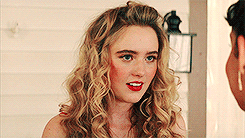
* ╰ KATHRYN NEWTON ; TWENTY ; SHE / HER —— wow, DORCAS MEADOWES sure has grown ! it’s almost hard to believe they actually passed recruitment… i still remember them being so INTUITIVE & OPTIMISTIC now they just seem MATERIALISTIC & CAPRICIOUS. guess they’re special if they made it this far. word in the halls is they’re training to be a HIT WITCH but i don’t think they’ll make it out alive. after all, they’ve shown signs of being NEUTRAL in the war.
PINTEREST
character inspo: amy march ( little women ), shelby wyatt ( quantico ), glinda upland ( wicked ), rachel green ( friends )
dorcas louisa ruth meadowes hails from old money, sweltering summer heat, peaches, spanish moss, and crickets at dusk. she grew up in the american deep south, the baby of a well-established pureblood family.
with four older siblings, two doting parents, and a fleet of nannies, dorcas was never in want of attention. basil & myra meadowes married and had children young and fast; her mother had dorcas’s eldest brother when she was only twenty one, and had dorcas ( the youngest ) five years later.
( her siblings, in order: montgomery, or monty. the only boy, aged 25. clementine, 23. the twins, willow & winona, 22. and last comes dorcas, 20. )
their parents loved them, to be sure, but basil & myra were never much for hard work; the nannies dealt with diaper changes and crying toddlers and scraped knees.
but when the sun was shining, the meadowes would gather their offspring and spoil them rotten with picnics, and weekends at their beach home, and banquets with all basil & myra’s friends. and so all dorcas’s childhood memories of her parents are of laughter and golden days and bliss.
basil & myra held frequent catered banquets, the adults getting flushed and tipsy off rot-your-teeth sugary drinks, cooing over the dolled-up children. dorcas adored the attention. she loved dressing up in her best clothes and showing off the meagre magic she could do ( though she still had impressive control over wandless magic for a child ) and being patted on the head and called darling.
i’m pretty sure jkr has said that ilvermorny is the only north american wizarding school but i’m gonna go ahead and say fuck that cause i can’t see dorcas and her siblings going to ilvermorny, since 1) it’s in massachusetts and 2) it “ has the reputation of being one of the most democratic, least elitist of all the great wizarding schools ” and i think dorcas would’ve gone to a preppier school
also, one school for all of north america ? yeah ok, sure
so we’ll say she went to a smaller, more prestigious wizarding school in virginia, the wizarding equivalent of a private school. aglionby academy vibes from the raven cycle.
it wouldn’t be quite fair to say dorcas excelled in school. she did quite well, but she wasn’t top of her class. more like … fourth in her class.
she wasn’t even top in her siblings. they all had their unofficial roles to play. monty was the athletic one, clementine was the brainy one, the twins were charming and mischievous, and dorcas … dorcas was the pretty one.
but that doesn’t bother dorcas. she loves her siblings, and she loves her parents. everyone knows how close the meadowes family is.
the thing about dorcas is that she never seems bothered. she floats through life with a carefree, laissez-faire attitude, apple-cheeked and dimpled, laughing off any failure that comes her way, because hey, no big deal, it wasn’t that important anyway.
( if you asked dorcas what is important to her, what matters to her, she would have trouble giving you an answer. )
dorcas flits from short-lived interest to short-lived interest. when she was thirteen, it was horseback riding. when she was fourteen, it was wandlore. when she was fifteen, it was poetry. but none of them lasted very long, conquered by that old familiar restless boredom.
dorcas is the quintessential baby sister ( think amy march ) which is why, when monty enrolled in a martial arts course, dorcas insisted on enrolling as well. ( i feel like wizards probably have their own unique styles of martial arts, but i’m gonna say it was something like jiu jitsu where you use the opponent’s strength against them, since dorcas is fairly small )
soon after, monty was recruited by the american quodpot team and had to leave. but dorcas stayed on. something about the thrill of it, the foreignness and the physicality, kept her hooked. when she was on the mat, there was no past or future, just in the moment.
not that she vocalized any of that. if you asked her, it was just a fun way to stay in shape.
dorcas’s parents found their daughter’s new ‘ hobby ’ strange, but delightful and cute, trotting it out as a fun tidbit at parties when they showed dorcas off. did you know, dorcas reckons she’s a wrestler now – bless her ! watch out, she’s dangerous ! followed by a round of laughter.
as a child, dorcas would’ve loved the attention, but now, it was starting to grate. not that she would’ve ever dreamed of protesting — she loved her parents, and they meant well. there was no sense in making a big deal over a silly hobby. it wasn’t that important anyway.
the only person who took her seriously was her coach, a fearsome, grizzled wizard with an amusing name. in fact, robert robertson took her more seriously than she took herself. he wouldn’t let her quit when things got tough, and under his tutelage she branched out, explored other fighting styles, met other experts.
her parents’ interest in her martial training waned quickly, especially when a new hobby came along, one with well-defined cheekbones and striking grey eyes. seymour darville was the nephew of a family friend. also pureblood, of course. he and dorcas hit it off right away, and it wasn’t long before they were an item and their gossipy relatives finally had something to gossip about.
years went by. dorcas grew from a teenager to a young adult. she continued her training. meanwhile, her relationship with seymour solidified. her older siblings all found partners and wed young, just like their parents. dorcas became an aunt four times over. their gossipy relatives began dropping not-so-subtle hints, wondering when it would be dorcas’s turn to take the veil. the cement of dorcas’s future life was hardening.
seymour proposed over a candlelight dinner with roses and a ring, violins enchanted to serenade them. it was picture-perfect, something straight out of a romance novel.
dorcas didn’t answer. she told him she needed time to think about it. for a girl unable to commit to most things, a husband was an awfully big commitment. especially one she feared she’d fallen out of love with. but her family was expecting it, and his family was expecting it, and besides, there was nothing that made a girl half so interesting as a diamond on her finger. right ?
and that was when dorcas was recruited for edin, by robert robertson personally. dorcas had never been overseas before. she’d always stayed home, comfortable with the spanish moss, the peach trees, and american pureblood tradition. going to edin would be … insane. training to be a hit witch ? dorcas wasn’t a hit witch. she’d get one month in before she got bored and wanted to leave. not to mention how far it was. and she had family in georgia, a loving boyfriend, a future.
these were all things dorcas’s family said when she told them she would be going to the united kingdom for a year.
i’m just worried about my little girl, darlin’, her mother said. you’ve never been so far from home before. what if something happens ? what if you don’t come back ?
to which dorcas replied, well, of course i’m coming back. i can’t miss my own wedding.
and of course, that derailed their protests completely, as dorcas knew it would. dorcas would go to edin and play hit witch, have her fun for a year, and then she would come back to her family and her fiancé. shackled to home for life. and edin, and dorcas’s martial training, and the one thing she’d committed to in her life, would stay an ocean away.
some other things:
even though rappaport’s law forbidding muggle and magic interaction was lifted in 1965, when dorcas was five years old, the segregation between muggle and magic was too deeply ingrained to fade that easily. as such, dorcas is HELLA clueless about the muggle world ! her private school had very few muggleborns, and the muggleborns that did attend kept quiet about their heritage. there was no muggle studies or anything of the sort.
she’s also used to being rich af lol
other than on the mat, dorcas tends to avoid conflict. she’s genuine, kindhearted and optimistic, and remarkably in tune with others’ emotions, though her pureblood naïveté might rub some the wrong way.
she’s like … fucking good at fighting. she’s nimble and surprisingly strong, and people tend to underestimate her. she works hard to keep herself in top physical health. she eats healthy and exercises regularly.
this was a fucking NOVEL i am so sorry
4 notes
·
View notes
Text
Rocka My Soul
Rocka My Soul
“Rocka My Soul in the Bosom of Abraham” is a song about being close to and in the comfort of God. It is primarily sung in African-American churches, but on the night of December 12th, 1981, the majority of the 76,000 plus fans at Rice Stadium, black and white, were standing, singing the song in unison. They were singing to inspire on the Jack Yates High School Lions, who were seeking to become the first all African-American football team to make it to the Texas state championship since high school sports were desegregated in 1969.
If you were fortunate enough to be at Rice Stadium that night, you just knew that it was more than a football game – it was a celebration of a transformative journey. The energy in the stadium was powerful in the most beautiful of ways - it hit you in your heart and in your soul. It emanated love, passion, resilience, redemption, and the power of community
Background
John Henry “Jack” Yates, for whom Jack Yates High School was named, was a leader, educator, a community builder, and man of vision. Born into slavery on July 11th, 1828 in Gloucester County, Virginia, Jack Yates taught himself to read and write, and also mastered carpentry.
When Texas became the last state to end slavery on June 19th, 1865, Jack Yates and his wife Harriet moved to Houston. He became the first minister of Antioch Missionary Baptist Church, the center of political, cultural, social and educational life for the flourishing community of free black men and women. Deeply committed to building community and to empowering that community through education, Reverend Yates founded the Baptist Academy (the forerunner to Texas Southern University), which focused on preparing students for careers in business and the ministry.
Jack Yates Colored High School opened its doors in 1926. In the early 1980s, the school was at the center of a vibrant, engaged ecosystem of teachers, students, parents, alumni and the broader community. And the bonds that were the basis of the Jack Yates community in the 1980s are as strong now as they were back then. There is a frequently used expression “JY4Life” which captures the essence of what it meant and still means to be part of the Jack Yates community. It is hard to overstate the pride and deep sense of connection that Yates alumni still feel towards the school and towards one another.
Lori Dee Mack, a criminal defense attorney in Houston, was a cheerleader and editor of the yearbook at Jack Yates in 1981. “Yates just had a special vibe to it, we were the cool school,” Ms. Mack said. “Part of what made it so special was the involvement of the community. We were expected to make something positive out of our lives, and those expectations were reinforced by our community.” Jackie Clark was a senior and the majorette on the acclaimed Jack Yates marching band in 1981. “Our parents and our teachers knew one another, expected a lot from us, and they worked together to ensure that we performed in the classroom and were good representatives of our community,” Ms. Clark stated.
The Yates sports teams were the focal point for community engagement, football in particular. From the beginning, the school was successful in football, wining four Prairie View Interscholastic Negro League state titles. Since the end of segregation, however, only once had the Lions advanced past the first round in the playoffs.
In spite of the playoff history, expectations were high going into the 1981 season. Several starters at key positions returned from a team that went undefeated during the 1980 regular season - quarterback Thomas LeDet, offensive linemen Rodney Henry and John Simmons, wide receivers Jeffrey Fields and Keith Burnett, middle linebacker Sebastian Harris (who made All-City his junior year), defensive linemen Stephen Baker and kicker/safety Lemuel Moton. That core group would be bolstered by several key additions, including defensive lineman Eddie Gilmore (who had to sit out his junior season after transferring from Sterling High School) and running back/wide receiver Randolph Wilburn, who transferred from Lincoln High School which closed in the spring of 1981.
Preparation for the 1981 season began in May with spring training, and continued throughout the summer. LeDet, who came into his own at the end of the 1980 season, wanted to make sure that he and his teammates were fully prepared going into the 1981 season. He organized practices with his receiving corps that summer. “I wanted for us to get comfortable working with one another and to get our timing down,” LeDet stated.
High school teammates working out together during the summer is now routine in Texas, but in the early 1980s it was not common. Little did LeDet or his teammates know how prescient these self-organized summer sessions would turn out to be.
The Season
The season began as expected, with a win over Worthing High School.
The following week the Lions suffered a stunning and crushing defeat at the hands of Smiley High School. That loss, however, would prove to be the turning point of the season. “We needed that loss,” John Simmons stated. “It made us realize that we were not as good as we thought we were, and that we need to get focused if we were going to accomplish our goal, which was to win the state championship.”
In that game, Smiley RB John Stewart ran roughshod over the Lions defense. To this day Sebastian Harris is livid about the loss to Smiley. Harris is a smart, thoughtful, proud man who still looks like he could level an NFL running back. “We were out hit that game,” he says, with both surprise and disappointment. John just ran all over us, we had never experienced a running back with such speed, power and determination. The gentlemen just set the tone and had his way the entire game.”
The next week in practice 2nd year linebacker coach Coger Coverson, a former Washington Redskins offensive guard and Yates alum, declared that every position on defense was open. Practice started with the intense and savage bullring drill (this is the drill where one player is in the middle of a ring and takes on other players in rapid sequence). It was perhaps the most intense week of practice during our time at Yates.” That week set the tone for the rest of the season, as the Harris, Stephen Baker and Eddie Gilmore led defense would pitch 5 shutouts on the way to allowing just over 10 points per game the rest of the season.
Offensively, Smiley had stacked the line of scrimmage, daring the Lions to beat them with the passing game. Yates was historically a power running team, and Coach Luther Booker was loath to abandon the run. The Lions finally began passing in the 4th quarter, but by then it was too late. Yet Booker saw enough that game to convince him to let LeDet and the passing game become the focal point of the offense. “We discovered that we had good quarterback that game,” John Simmons said. The investment LeDet and his receivers made that summer was about to pay-off in a profound way.
Under LeDet’s leadership the offense exploded, averaging almost 30 points per game the remainder of the season. In an era where the running game was focal point of most offenses, the Lions wide-open and vertical passing game was novel and exciting. In addition to Fields, Burnett and Wilburn (who had moved from running back to wide receiver), LeDet had wide receiver Rayfield Gee and powerful tight ends in Sylvester Morgan and Leonard Moon. LeDet would go on to have the sixth most productive passing season in Houston high school football history.
As the season progressed and the Lions advanced in the playoffs, the city of Houston began to take notice. The Lions explosive offense, dominating defense and high-flying marching band were a weekly show that was hard to beat. “As we started winning everyone wanted to be associated with us,” Harris said. “Radio stations, newspaper reports, television stations – they were around us all of the time.”
From a purely entertainment perspective, the highlight of the season came when the Lions went head to head with the famous “Who Shot JR” episode of Dallas, which at the time was the highest viewed television show in US history. “I remember Saturday November 21st - that was the night that the “Who Shot JR” episode aired, Mack said. “We were playing Booker T Washington in bi-district at the Astrodome and the stadium was packed. We went head to head with one of the most watched television shows of all time and won,” she said laughingly.
Blacks and whites lived in separate worlds during those days in Houston. When their worlds intersected, it was often confrontational. There was a clear lack of trust and understanding between the two communities. Yet somehow the Lions performance was able to transcend race and bring those two worlds together, at least for a period of time.
“When I was a teenager, I did encounter some forms of subtle prejudice, Thomas LeDet said. “However, I learned to ignore it. But for many of my teammates and friends, racism was hard to ignore. The stares we encountered when we entered a sporting goods store, personnel following you around, etc. But that changed when we beat Aldine in the quarterfinals.”
“ I remember walking into Foleys’ department store with my teammates Jeffrey Fields and Kenneth Wiley after we beat Aldine in the quarterfinals. We were wearing our letterman jackets. As we entered the store, we noticed a distinct change on the part of the personnel - instead of suspicious and concerned faces there were smiles accompanied by quick service and people asking us if they could help us. Shortly after entering the store, a middle age white woman hurried over to my side and pointed to a Volkswagen size photo on the upper banister right in the entrance of the store. It was a picture of the entire team and staff of the 1981/82 Jack Yates football team! Needless to say, we stood speechless for a moment and then were elated. We knew at that moment that we were something special not just to the black community, but also to the entire city. “
“I remember during the playoffs a very popular white radio station (104 KRBE) was broadcasting live from the Jack Yates School of Communications. Quite a few students told me as I walked towards the lunchroom that the DJ was looking for me. As I approached, he announced, "Here he comes the man of the hour.... Mr. Thomas LeDet, the quarterback for Jack Yates High School. He began to ask me questions about our season and if I thought we were going to go all the way. It was exciting and fun, and at the end, the DJ asked me, what was my favorite radio station. As we both chuckled.... I said, as of today, KRBE is one of my favorites. And then the DJ playfully asked me if I had ever heard of 104 KRBE. We both laughed and I said no. At that point, he presented me with a trophy of a giant #1 symbol with the radio station call letters and “Congratulations on a Great Season” engraved. He went on to say that the radio station and the entire City of Houston were cheering for us in the upcoming regional championship. I was left with a feeling of joy and the sense that our team meant more to the city than just football.”
The Breakthrough
The Lions marched through the playoffs, defeating Booker T. Washington in bi-district, Houston Madison in the regional finals and Aldine in the quarterfinals. Next up? Perennial power San Antonio Churchill in the state semi-finals
The Chargers, who were led by quarterback Cody Carlson (Carlson would go on to star at Baylor University and play seven years in the NFL) and had a glorious history of advancing deep in the state playoffs, including winning the championship in 1976. They were heavily favored to defeat the Lions and advance to the state championship.
Fittingly, Rice Stadium was chosen as the site for the game. On September 12th, 1962, President Kennedy delivered his famous “We choose to go to the Moon” speech at Rice Stadium, a vision which was realized with the Apollo 11 mission in July 1969. Now, 19 plus years later, the stadium was again the site for another potential pivotal moment – if Yates could defy the odds and beat Churchill, they would become the first all African-American team to make it to the state championship.
The week leading up to the game was frenetic. “The whole community rallied behind the guys,” said Nanette “Nettie” Simmons, a cheerleader in 1981. “And it continued to and throughout the game. It was a cold and wet night, but I remember the stadium overflowing and people sitting on the grassy hill outside the stadium to watch the game.”
Churchill jumped out to a 14-0 lead, thanks to some great running by Doug Hodo, pinpoint passing by Cody Carlson, good play calling, and a bit of luck – the headsets on the Yates side were not working until the second quarter so Yates was not able to make defensive adjustments to counter the Chargers. Sebastian Harris rallied the defense, the Lions made adjustments and held Churchill scoreless the second quarter. Thomas LeDet and the offense got untracked, with LeDet throwing touchdown passes to Rayfield Gee and Keith Burnett. Churchill scored a safety to make the game 16-14 at halftime.
The week before Yates had trailed Aldine 14-0 before exploding for 42 straight points in a 42-14 win. But this game had a much different feel to it. “We knew we were in a fight. Those guys – Churchill – were tough and would not quit,” said both running back Artie Mitchell and punter Ronald Davis.
The second half was like a classic heavyweight boxing match, a la Rocky Balboa vs. Apollo Creed, with Yates ironically playing the role of Rocky. Churchill scored to go up 23-14 and looked to be on the verge of blowing the game open, when Harris rallied the defense and LeDet the offense. LeDet hit Keith Burnett with a 69-yard touchdown pass, ran for a score, and Harris forced a fumble which led to a Moton field goal. Suddenly Yates was up 31-23 with under 5 minutes left and it looked like they had all of the momentum.
Carlson and Churchill responded by driving to mid-field. Harris and the defense forced a 4th and 10 and a time-out was called by the officials to confirm the game statistics. In those days there was no overtime, in the event of a tie the team with the most 20-yard line penetrations and first downs advanced. Churchill was ahead in both.
On 4th and 10 Carlson completed a 47-yard pass to Harold Huggins. Three plays later Churchill scored to trail 31-29. Churchill then made a 2-point conversion on a tipped pass, and the score was 31-31. Less than 2 minutes remained.
LeDet led the offense to the 45-yard line, where three straight long passes to Burnett and Fields were incomplete. It was now 4th and 10, and arguably the most important play in the history of not only Yates football but perhaps for inner-city schools across the state of Texas was forthcoming. Since segregation in Texas high school sports ended in 1969, a widely held perception was that an all African-American football team lacked the intellect, discipline, mental toughness and adaptability to advance far in the playoffs. The Lions had been shattering that myth all year, winning by playing smart, disciplined football and adapting at key points during the season. Fittingly, for them to advance to the championship, they would once again have to call on these traits to convert, score and then hold Churchill in check.
“I told Thomas and Coach Booker that I was open underneath all game long,” said Randolph Wilburn. “Thomas and I convinced Coach Booker that Churchill would double cover Keith (Burnett) and Jeffrey (Fields), and to pass to me on an underneath route. We were confident that we could get the 10 yards and convert.”
Everyone was on their feet as LeDet approached the line of scrimmage. LeDet dropped back, avoided the Churchill rush and made a perfect throw to Wilburn, who caught the ball at the Churchill 45-yard line. Wilburn then put his running back skill to use, and thanks to blocking from Jeffrey Fields advanced the ball to the Churchill 20-yard line.
The Lions were well within kicker Lemuel Moton’s range, but this game was about making history, and they were not going to let a field goal determine their fate. “We had momentum and believed we could run the ball to victory,” said John Simmons. Behind crushing blocks from Simmons, Rodney Henry, Byron Strain, Phillip James, James Jackson and Sylvester Morgan, the Lions ran the ball 4 straight times, with LeDet scoring to put the Lions up 38-31.
However, there were 40 seconds left on the clock. And Churchill & Carlson had countered Yates all night long with big plays of their own.
As Ronald Davis lined-up to kick-off, the energy in the stadium as frenetic. There was no way that these fans and the spirits of the African-American men and women who paved the way for this moment were going to let the Lions falter. Reserve linemen Tracy Sandles pinned Churchill inside their own 10-yard line on the kick-off. On the ensuing play, Carlson never had time to get off a pass –Gilmore, Baker, and the passion and energy of the city of Houston sacked him in the end zone for a safety. Yates 40 Churchill 31!
As LeDet ran out the clock, students, teachers, alumni, and fans – black and white - from across the city of Houston poured onto the field to celebrate with the team. Rice Stadium was again the setting for a historical moment. It was not just that Yates become the first all African-American team to advance to the championship, it was how they did it. They shattered long-held racist myths about African-American teams lacking the intellect, character and discipline to advance.
LeDet was also a terrific role model for a new generation of African-American quarterbacks. Historically, when African-Americans were allowed to play quarterback it was as an option quarterback, not a pro-style quarterback. Barry Switzer at Oklahoma and Bill Yeoman at Houston were pioneers in allowing African-Americans to play quarterback, but those were in running offenses where the quarterback was essentially a running back. It seems hard to believe but the perception that African-Americans could not lead a pro-style offense (where the quarterback was responsible for making all key decisions – passing and running) delayed Hall of Fame quarterback Warren Moon’s entry to the NFL by 6 years.
The Aftermath and the Present Day
The Lions would go on to lose the state championship 19-6 to Richardson Lake Highlands the following week. The Lions had 8 turnovers and offensively were in a funk all game long. The Harris-led defense dominated Lake Highlands, effectively hold them to 12 points on 4 field goals. But it was just not meant to be.
However, the victory of breaking through and making it to state in the way they did had a powerful impact, one that went beyond the football field.
The relationship between educational attainment and Texas high school football is more often than not negatively correlated. However, the 81 team, in the spirit of Reverend Yates, helped reversed this relationship by helping awaken their community to educational possibilities.
“At first colleges sent athletic recruiters to Yates because of the success of the football team,” Lori Dee Mack said. “They quickly followed by sending academic recruiters, and all of a sudden we started to hear about schools like TCU, which we did not know existed. At the time we thought the only college options were local schools Texas Southern and the University of Houston. All of sudden were aware of all of these other schools – this just would not have been possible had the team not done so well and attracted the attention it did…”
“I wound-up going to TCU with 3 of my girlfriends, and other friends went to the University of Texas, Texas A&M, etc. It was really incredible how the team’s success opened doors for us students, “Mack stated. “It was also very comforting knowing that people from our community (Thomas LeDet and Keith Burnett went to TCU with Mack and her friends) were going to these schools.”
And the football team also set an example for the students. “I remember Coach Booker saying that 90% of the players he coached went-on to college,” Randolph Wilburn noted.
In 1985 the Lions would go undefeated and win the state championship, becoming the first all African-American football team to win a state championship in Texas post segregation. That team, which was led by running back Johnny Bailey, is widely considered to be the best team in the history of Texas high school football.
The path for the 85 team had been paved 4 years earlier by a remarkable group of young men. “The players on the 81 team had a sense of humility about them,” Mack said. “They didn’t let the attention go to their heads, and you just knew that they were going to do something positive with their lives.”
The magic of the 81 team’s journey continues to resonate to this day. Stella Hall, a cheerleader in 1981, currently works at MD Anderson Cancer Center. She was recently at a conference in Wisconsin and was speaking with a man who, when he found out she went to Jack Yates, asked her if she knew Thomas LeDet, Sebastian Harris and Jeffrey Fields. “He somehow knew about our school, the 81 team and the key guys on that team,” Stella said, shaking her head in disbelief.
Thomas LeDet was recently approached on two separate occasions – one by a former Yates student who graduated in the 1990s, the other by a former cafeteria worker from the University of Houston (LeDet worked at the University of Houston cafeteria while in school, serving the likes of Hakeem Olajuwon and Clyde Drexler). Both individuals wanted to tell LeDet how much the 81-team inspired them.
“At times it just seems incredible, he says, reflecting on the impact of the 81 team. We were just focused on winning on the field. It is really special to know that we inspired people.”
1 note
·
View note
Text
Most Overlooked Movies in Oscar History
Well guys, its official, Green Book was awarded the highest honour a single film can be given. Best Picture. If you spent any time on Twitter the day after the 91st Academy Awards you will have noticed that film nerds were not exactly thrilled by the decision, film Twitter immediately erupted into a discussion about all the films that didn’t receive the nomination that may have been more worthy winners than Green Book. Films like Eighth Grade, The Miseducation of Cameron Post and If Beale Street Could Talk appear to have benefited far more in regard to free publicity than any of the actual nominees. Of course, this isn’t the first time that the academy has failed to acknowledge the real best of the year and it certainly won’t be the last. So, in the spirit of being mad at the Academy let’s take a look at some of the worst historical snubs of all time.Well guys, its official, Green Book was awarded the highest honour a single film can be given. Best Picture. If you spent any time on Twitter the day after the 91st Academy Awards you will have noticed that film nerds were not exactly thrilled by the decision, film Twitter immediately erupted into a discussion about all the films that didn’t receive the nomination that may have been more worthy winners than Green Book. Films like Eighth Grade, The Miseducation of Cameron Post and If Beale Street Could Talk appear to have benefited far more in regard to free publicity than any of the actual nominees. Of course, this isn’t the first time that the academy has failed to acknowledge the real best of the year and it certainly won’t be the last. So, in the spirit of being mad at the Academy let’s take a look at some of the worst historical snubs of all time.
The Avengers (2012)
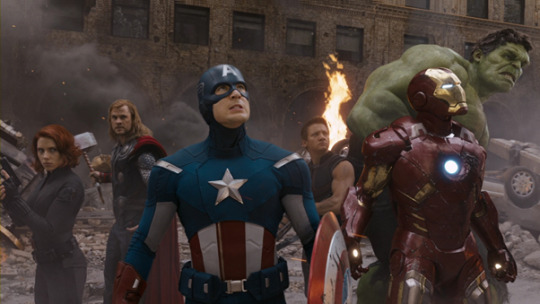
Actual nominations: Argo, Amour, Beasts of the Southern Wild, Django Unchained, Les Misérables, Life of Pi, Lincoln, Silver Linings Playbook, Zero Dark Thirty.
The Academy has historically looked down on superhero films with no comic book adaptation receiving a Best Picture nod before Black Panther earlier this year. While The Avengers may not have been the most artistic or dramatic film of 2012 it is hard to deny it’s impact. When future generations look back on the films of the 2010s The Avengers will likely stand out as one of the most important releases. With the Marvel Cinematic Universe feeling like a part of everyday life it can be hard to remember just how big a risk this movie was at the time. Think pieces were all over the internet about how the film would ultimately end up as an unwatchable, convoluted mess of ideas that would end Joss Wheadon’s career. How wrong they were.
If the Best Picture award is supposed to honour the greatest and most important achievements in modern cinema then The Avengers absolutely deserved to end up on the ballot, but we don’t live in the universe where The Academy does cool stuff like that.
Eternal Sunshine of the Spotless Mind (2004)
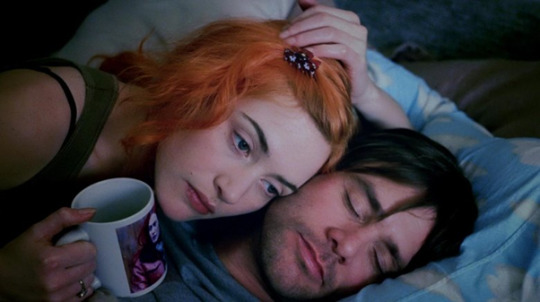
Actual nominations: Million Dollar Baby, The Aviator, Finding Neverland, Ray, Sideways.
How on earth did this happen? It truly amazes me that more members of the academy felt that Finding Neverland deserved more acclaim than Eternal Sunshine. Going of the assumption that the ‘best picture’ should be the film with all its filmmaking elements working perfectly together then Eternal Sunshine should win every year. Charlie Kaufman won the award for original screenplay and Kate Winslet received the only other nomination for lead actress, this film didn’t even receive a nomination in any of the technical categories. The treatment of Michel Gondry’s masterpiece by the Academy should be seen as a permanent black spot on the ceremony’s reputation.
Who Framed Roger Rabbit (1988)

Actual Nominations: Rain Man, The Accidental Tourist, Dangerous Liaisons, Mississippi Burning, Working Girl
Hear me out on this one. Roger Rabbit is one of my all-time favourite movies and for that, I’ll admit, I’m a little bias. That being said I truly believe that this is one of the finest achievements in cinema history from a purely technical level. The nominees for the 61st Acadamy Awards are solid (for the most part wtf is going with The Accidental Tourist?) but none of these films are as impressive as what Robert Zemeckis and his team were able to achieve by mixing live action film with 2D animation. Roger Rabbit is more than just a gimmick however, this a very entertaining and genuinely compelling detective story at its core. Once again, the term ‘Best Picture’ feels perfectly defined while discussing this film, a film that wasn’t even considered for the award.
Donnie Darko (2001)
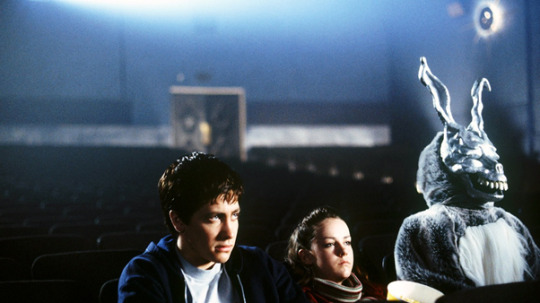
Actual Nominees: A Beautiful Mind, Gosford Park, In the Bedroom, Lord of the Rings: The Fellowship of the Ring, Moulin Rouge
Excuse my language but Donnie Darko is a fucking great movie. Here is another year where the nominees were pretty solid but come on you can’t tell me that Donnie Darko was too weird and abstract when you nominated Moulin bloody Rouge! Donnie Darko is the sort of film that is still being discussed to this day with so many incredibly well thought out details both in the direction and the screenplay. When you ask a film lover what is so special about the medium it is films like this that they will point to, with an excellent score, great performances, hypnotically simple editing and masterful direction it doesn’t put a foot wrong. Do I really have to spell out what the words ‘Best Picture’ mean again?
WALL.E (2008)

Actual Nominees: Slumdog Millionaire, The Curious Case of Benjamin Button, Frost/Nixon, Milk, The Reader
Let’s talk about animation for a bit. Only three animated films have ever been nominated for top prize (Beauty and the Beast, Up and Toy Story 3) considering the amount for excellent animated film are not those three I had a lot to choose from. With the likes of My Neighbour Totoro, Toy Story, Aladdin, The Little Mermaid, The Lion King, Princess Mononoke and The Nightmare Before Christmas going completely unnoticed the academy has found a way to further segregate the medium of animation from live-action film by introducing the ‘best animated feature’ award at the 2002 ceremony. This addition has led to films like Spirited Away, Finding Nemo, The Incredibles, Ratatouille, Frozen, Inside Out and most recently Spider-Man: Into the Spider-Verse receiving an award without having to let them compete with live action films. There are no academy rules that state animation cannot be considered for Best Picture it just doesn’t happen. I have singled out WALL.E because I think it showcases exactly what modern animation has achieved. WALL.E is a largely silent film with gorgeous visuals and a strong environmental message that is still accessible to general audiences, including children. Surly one of Pixar’s finest achievements deserves to be held in just as high regard as David Fancher’s 8th best film.
Ps. You will notice a distinct lack of The Dark Knight in the 2008 nominations as well.
Psycho (1960)

Actual Nominees: The Apartment, The Alamo, Elmer Gantry, Sons and Lovers, The Sundowners
Another genre historically left out of the running is horror. Only 6 horror films have ever been up for the award (The Exorcist, Jaws, The Silence of the lambs, The Sixth Sense, Black Swan and Get Out). Horror is a genre that is often looked down upon in the film community for being ‘low-brow’ and not as artistic, a similar struggled as the one faced by the superhero genre. With important releases such as: Texas Chainsaw Massacre, Suspiria, Halloween, Alien, The Shining, Let he Right One In, Night of the Living Dead and perhaps most surprising, Psycho going unnoticed by the academy it is clear to see that there is a bias against the genre somewhere in Hollywood. Psycho is also emblematic of another problem with historic best picture nominations. What on earth is the academy’s issue with Alfred Hitchcock? Psycho is not the only of Hitchcock’s classic films not to receive the nomination, in fact North by Northwest, Vertigo, Rear Window and Dial M for Murder were all snubbed.
On a related note despite being nominated 5 times Hitchcock never received the Oscar for best director putting him in the prestigious company of: David Lynch, Terry Gilliam, Ridley Scott, Wes Anderson Quentin Tarantino, David Fincher, Edgar Wright, Spike Lee, Charlie Chaplin, Orson Wells and Stanley Kubrick. So, I guess you could say that it isn’t just the Best Picture category that doesn’t make sense.
These were 6 examples I felt I could make a point out of, it is important to remember that many more examples are out there of revolutionary masterworks that went unrecognised come awards season. People don’t take into consideration what happens behind the scenes at the Oscars. The ceremony needs good ratings, The Academy needs to honour films with progressive messages that are easily digestible, and everyone has an agenda and wants to see their friends win. The Oscars are a lot of fun, it gives people like as a chance to talk about the films we loved that year hopefully see our favourites given some well-deserved recognition but let’s not take it more seriously than we should. Next year when the Academy inevitably choses to honour mediocrity remind yourself that The Third Man wasn’t nominated in 1950 or you could remind yourself that Singin’ in the Rain wasn’t nominated in 1953, alternatively mention that 2001: A Space Odyssey was snubbed in 1969, The Matrix in 2000, Back to the Future in 1986, Pan’s Labyrinth in 2007, Cool Hand Luke in 1968. Or if you want your could run into the street and shout about how, Duck Soup, Modern Times, His Girl Friday, Night of the Living Dead, The Shining, The Good, The Bad and The Ugly, Oldboy, Reservoir Dogs and The Big Lebowski all weren’t nominated for god dammed thing.
Nathan Needs A Username’s Must See Movies: https://letterboxd.com/nathan_r_l/list/nathan-needs-a-usernames-must-see-movies/
Nathan Needs A Username’s Avoid At All Cost Movies: https://letterboxd.com/nathan_r_l/list/nathan-needs-a-usernames-avoid-at-all-cost/
#oscars#acadamy awards#the avengers#eternal sunshine of the spotless mind#who framed roger rabbit#donnie darko#wall.e#psycho
86 notes
·
View notes
Text
Daybreak Academy: Chapter 02
Rumors Among Friends
Summary: In which a rag-tag study group adopts Anora into their circle.
Word Count: 1,237
First | Previous | Next
☆ ⚬ ☆ ⚬ ☆ ⚬ ☆ ⚬ ☆ ⚬ ☆ ⚬ ☆ ⚬ ☆ ⚬ ☆
“You're new around here, aren't you?”
“Ohuh?”
Anora had been sitting alone in the cafeteria when someone had come up to her. She blinked for a moment at this new person, another girl dressed in white overalls and red pirate bandana around her head, with tanned skin, blue eyes, and long silver-like hair.
“You're the new kid everyone's talking about, yeah?” the girl then asked again, taking a seat across from Anora. “My name is Pyra. My friends and I were talking, and figured you looked pretty lonely, so we thought we could invite you to our study group!”
Anora blinked. She must have been giving an incredibly distrusting glare because Pyra gave a small, nervous laugh.
“You don't have to if you don't want to.” Pyra then sheepishly admitted. “There's only four of us now, so even if you aren't used to a lot of people, we're still pretty small. I remember when I first came and everything seemed to confusing, I just want to make sure that you don't feel the same way; you know?”
Despite herself, Anora gave a small smile and a nod. Pyra happened to see it and smiled right back.
“Here,” she then decided, digging around for something to write with, “Let me write down the building and room number. We'd have our meetings in our dorm rooms, but, you know, it's a tight segregation. No boys in the girls' dorms and vice versa. Not that I'm particularly opposed to it or anything...”
Once Pyra finished writing, she looked over it once more before handing it to Anora with an even wider smile. “There.” she said. But then she had an idea and pointed to a table not far from them. “You can also sit with us if you want to- we usually sit right over there.”
Anora looked at the paper before looking at where Pyra was pointing. At the other table were three other kids; one was dressed in what looked like a pink ninja inspired suit and pink frog hat, another with a large white afro, and one who an abnormally large moogle hat. The two of them couldn't hear what the group was saying, but judging by their laughter, it must have been something interesting. Anora looked up at Pyra.
“Can I?”
Pyra seemed momentarily surprised to hear Anora's voice. “Can you what?” she asked in a moment of confusion. When it hit her, she then asked, “Sit with us now? Sure! Come on, I'll help you bring your stuff over!”
Anora mumbled a humbled thank you as she and Pyra got her stuff together.
“Hey guys,” Pyra shouted at her friends once they were close enough to her friends, “The new kid wanted to sit with us!”
Immediately after her saying this, everyone at the table turned to look Anora dead in the eye. A moment after they started to shuffle themselves around so she could sit. Anora timidly took a seat across from the kid with the moogle hat, while Pyra sat next to her. With everyone's eyes on her, Anora could feel her face heat up from embarrassment.
“Hi.” she softly said to them. “My name is Anora.”
“Hiya!” the kid with the moogle hat immediately replied. “The name's Mog!”
The kid in the ninja getup gave a nod before saying, “Nin.”
“I'm Affie.” the kid with the afro greeted. “Nice to meet you Anora.”
“Hey Anora,” Mog quickly spoke up, “What house did they place you in?”
Anora shifted a bit in her seat, refusing to look at them for some reason. “Vulpes.”
“Really?” Affie wondered. “Seems like everyone and their brother gets saddled into Vulpes.”
“Makes sense though,” Nin mused. “Vulpes and Leopardus are kinda the junk drawer houses; it doesn't take much to get sorted into them.”
“Excuse you- you're talking to a member of Leopardus here!” Mog detested, slamming his fists on the table.
“Yeah, so?” came Nin's careless retort. “Are you super smart like the folks in Anguis? Or even physically strong like the Ursus people? Dude, your debate skills don't even hold a candle to the uptight ninnies in Unicornis!”
“Not all of us are uptight, Nin.” Pyra pouted. “Which is absolutely rich coming from someone in Anguis.”
Nin gave a small, callous half shrug in response. Pyra rolled her eyes at Nin before turning her attention to Anora. The new kid had only been half listening to the others and still seemed a bit overwhelmed. So Pyra decided to give Anora some context.
“You probably haven't noticed it yet,” she said, “But there's a bit of a rivalry between the houses.”
Anora gave Pyra a confused raise of her eyebrow. It went unnoticed by Affie, who then gave a sage-like nod before saying;
“Thankfully, not only are the dorms separated by gender, but house as well.”
“You do not want to see a fight between Ursus and Unicornus.” Mog then insisted, leaning in close to Anora. “They're brutal.”
At this, Affie jumped a little in his seat as he remembered something. “Speaking of; didn't one guy from Ursus send another dude from Unicornis to the hospital last week?” he asked in a hushed tone. “They said it was an accident during their fencing practice, but...”
“I thought it was just a rumor?”
Pyra shifted a bit in her seat before replying, “It kinda is? I didn't know either of them personally, but everyone in our dorm was talking about it. Some of the newer students had a harder time going to sleep that night. It was awful.”
A hush came over the group now. Anora felt herself shiver at the sudden silence- it was Nin who noticed and gave a small frown at Anora.
“Are we scaring you Anora?” Nin asked in a slightly worried voice. “Trust me when I say we're all sorry- it's just not school if things weren't complicated, you know? Most of us live on campus, and there are days when you can really feel the cabin fever setting in.”
But Anora shook her head and gave a small smile. “Tell me more.” she insisted. “About the school, please.”
Nin gave a small smile and started to open her mouth to say something, but was cut off my Mog.
“Man, where do we even start?!” he bemoaned quite loudly. “There's this whole rumor about Headmaster Ava and Headmaster Gula being together, and then there's that kid who's always hanging around Headmaster Ava, and that's not even going into how the whole Ursus versus Unicornis thing is because of Headmaster Aced and Headmaster Ira's absolute hatred of each other!”
“I think she meant about the school history, not the rumors.” Affie snorted.
“Same thing.” Mog argued with a wave of his hand.
“No, it's not.” Nin retorted before going into a small laughter.
Anora looked at the group before going into a spontaneous laughter of her own. They all looked at her for a moment in surprise, but it quickly melted away as they joined her. It had only been a little under 24 hours since Anora had arrived and now she had a group of friends to call her own. Even if she didn't feel like she belonged at Daybreak Academy, at least she had a group of good people to talk to. At this point in time while they were all happy, she even dared to question, what could possibly go wrong?
1 note
·
View note
Text
Let’s Talk About Jewel Plummer Cobb

Abstract
Jewel Plummer Cobb is a well-renowned American biologist, cancer researcher and academic administrator. She is also in the Connecticut Women's Hall of Fame for her groundbreaking research on skin cells that produce melanin and how they become cancerous.

Jewel Plummer Cobb was born in Chicago, January 17, 1924, to two loving and driven parents, Frank and Carrabelle Plummer. Her father, Frank Plummer was a Physician Graduate from Cornell University and one of the founders of the Fraternity, Alpha Phi Alpha. Her mother, Carrabelle Plummer was a schoolteacher. She was enticed by the medical field, because of the strong roots her grandfather, a freed slave who became a Pharmacist Graduate from Howard University and her mother who always enforced the importance of education. Although she came from an upper middle class background and a hard-working well to do family, she would still have to go to Chicago public schools for African Americans. Not letting this stop her determination, she used this to drive her to work harder. She would teach herself science with scientific journals and book in her father’s grand library as a supplement to her education. While in high school, she took extra biology courses to prepare her for further studies in the field of science.
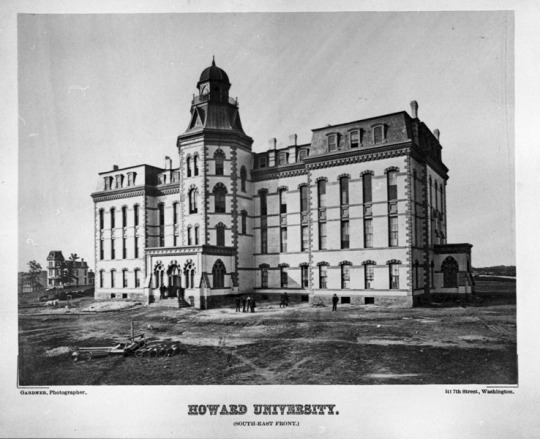
After high school, Jewel Plummer Cobb was ready for college and determined to take Biology by storm, however, she wasn’t ready for the discrimination she would receive at University of Michigan. In 1942, segregation was still prevalent and as an educated African-American woman in a Caucasian male dominated field, she was not accepted among her peers. All African-Americans (undergrad and grad) were put into one dorm and was not granted the same access to education as everyone else. Some classes and majors were not offered or allowed to be taken by an African-American. After much consideration and help from her Dean, Hilda Davis, she decided to transfer to a private historically black college, Talladega University in Alabama. However, Talladega did not accept her credits from University of Michigan, so she would have to start over as a Freshman. Not allowing it to sway her, Cobb was put into an accelerated program and worked through summer sessions until she was able to take the exit exams for most of the classes she had already taken at University of Michigan. She graduated with a B.A. in Biology in 1944. Cobb continued her studies and went on to earn a Master’s in 1947 and Ph. D in 1950 at New York University in Cellular Biology.

Jewel Plummer Cobb had exceeded expectation and was well on her way to having a promising career. Although she had all the qualifications to become a doctor, she did not want to work directly with the ill. Cobb wanted to focus on the theoretical research on prevention of diseases in the human body.
By 1952, she had established a dominant margin in research for cancer cells in University of Illinois. She put her focus towards the relationship between melanin and cancer cells. Aligning herself with cellular biology instead of molecular biology, because she wanted to study the synergy between living cells and not the molecules and atoms that create sells. Cobb also became a fellow member in National Cancer Institute (1950-1952). She detected that Methotrexate, which obstructs the growth of distinct cells in the body that progress too quickly ("Methotrexate." Drugs.com. Ed. Leigh Ann Anderson. Micromedex®, n.d. Web. 08 Dec. 2016.) is highly productive in specific cancers remedial process (specifically skin and lung cancers). Methotrexate has remained the most common chemotherapy treatment today.
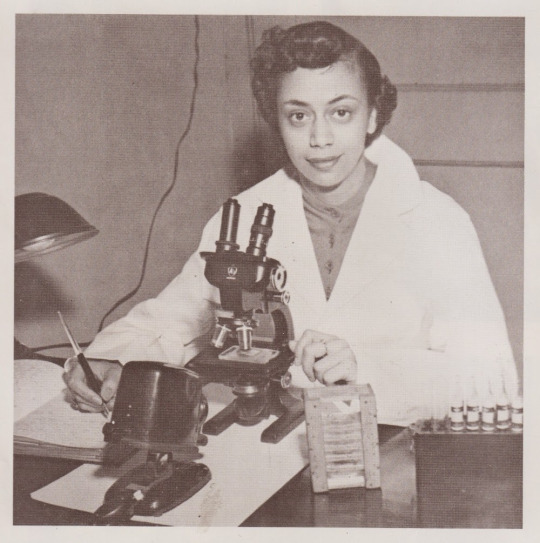
While at University of Illinois, where she became the director of the Tissue Culture Laboratory (Education Committee, Tissue Culture Association 1972-1974). Pigmentation research (black or brown pigments) was the first analysis she began, to find out more about its protective properties and its capability of preventing ultraviolet rays from harming the human skin cells. She progressed this research through academia as a researcher and assistant professor at New York University in 1955.
Through the 1960s (60-69) she was a Biology Professor at the Sarah Lawrence College. One of the main things she worked on at the time was Melanoma, a tumor of melanin-forming cells, typically a malignant tumor associated with skin cancer ("The Definition of Melanoma." Dictionary.com. N.p., n.d. Web. 08 Dec. 2016.).
After a marriage, a son, and a divorce in 1967. Jewel Plummer Cobb found herself at Connecticut College as the Dean of the school and Professor of Zoology. She assisted students in minority status, by creating private pre-dental graduate programs, which provided an ideal for other college programs that did not have many minority students in the medical field. Cobb continued to do her research, however, by 1976, she wanted to stick to the administrative side of teaching. In 1979, she composed a paper, “Filters for Women in Science, which was published in the book, Expanding the Role of Women in Sciences, and later redistributed in the Annals of New York Academy of Sciences,” (Notable Black American Women, Book I, Dona L. Irvin, Jennifer M. York, and Ralph G. A.

By the 1980s, Jewel Plummer Cobb moved to Douglass College. She was once again a Dean and Biological Science Professor. She strived to launch programs for minorities in the science field. Cobb also went to great lengths to educated the community on how underrepresented minorities are in the science field. The paper established a correlation among educational bureaucracy and filters, suggesting educational bureaucracy makes it extremely hard for women to enter science sectors. Also like a filter, systematic education and social environments produce a mentality in which a women were mostly hindered from studying math and science. Even if they did pursue a career in a science field, university tenure and equal pay would not be distributed to women.
In 1981, took a position in California State University (USC) as the President. She continued her crusade for equal opportunities among minorities and better quality education for all students. Cobb also received state funding to build a new engineering, computer science, and general science department for California State University. Built an apartment complex for students to dorm, converting California State University from a commuter’s college to a full on residential college. She privately funded the gerontology center on California State University Campus as well as create the first President’s opportunity program for ethnic students, to bring in the underrepresented.

In 1991, Cobb became the principal investigator for Southern California Science and Engineering ACCESS Center and Network. This organization searched for students that were specifically minorities that had interest in majoring in the sciences and fund their education.
Jewel Plummer Cobb persisted at California State University to advertise minority students to join both the science and math programs. She stablished a program where members of the faculty can tutor students on an individual basis for better chances for them to succeed. Cobb has gone through many lengths to speak out in the media about the imbalance number of minorities in science labs. She is hopeful that the numbers will eventually level out and minorities will frequent in all types of professions, not only a selected few. For her efforts and accomplishments, Cobb has been awarded and nominated, including twenty-one honorary doctorates from numerous universities and research grants.

Bibliography
Bradley-Holliday, Valerie. "Cobb, Jewel Plummer: The Black Past: Remembered and Reclaimed." Cobb, Jewel Plummer (1924- ) | The Black Past: Remembered and Reclaimed. N.p., n.d. Web. 08 Dec. 2016.
"Jewel Plummer Cobb, Biologist." Jewel Plummer Cobb, Biologist | African American Registry. Cultural Programs of the National Academy of Sciences, n.d. Web. 08 Dec. 2016.
"Cobb, Jewell Plummer." Contemporary Black Biography. Encyclopedia.com, n.d. Web. 08 Dec. 2016.
"Jewel Plummer Cobb." Jewel Plummer Cobb | Connecticut Women's Hall of Fame. Conneticut Women Hall of Fame, n.d. Web. 08 Dec. 2016.
Jewel Plummer Cobb, "Filters for Women in Science," Annals of the New York Academy of Sciences, Vol. 323, 1979; "Jewel Plummer Cobb," in Who’s Who Among African Americans (Farmington Hills, MI: Gale, 2003); Biography of Jewel Plummer Cobb.
"Methotrexate." Drugs.com. Ed. Leigh Ann Anderson. Micromedex®, n.d. Web. 08 Dec. 2016.
"The Definition of Melanoma." Dictionary.com. N.p., n.d. Web. 08 Dec. 2016.
"Webfiles." Jewel Plummer Cobb. N.p., n.d. Web. 08 Dec. 2016.
“ Photos of Jewle Plummer Cobb. Jessie’s Blog” http://jesselatour.blogspot.com/2014/07/jewel-plummer-cobb-life.html
#jewel plummer cobb#black beauty#black excellence#black women#black women empowerment#beautyintheblackness#black biologist#higherlearning#women of color#shades of color#beautiful women#educated black women#innovative black women#black women's history#historically black colleges
77 notes
·
View notes
Text
A Critical Film Review of “The Help”
An entertaining and somewhat light-hearted take on the harsh realities of racism in 1960’s Mississippi, “The Help” is a deeply moving, poignant, and hopeful story about how courage and working together can create change. It serves as a reminder of how compassion, strength, empathy, and honesty have helped in making the world a less horrific place to live in.
The film is based on Kathryn Stockett’s bestselling novel “The Help” which tells the story of African American maids working in white households in Jackson, Mississippi, during the early 1960s.
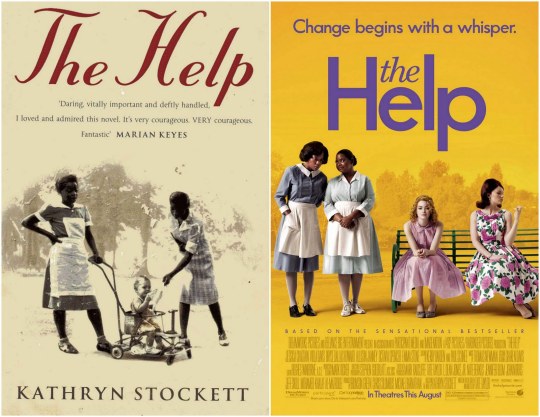
Synopsis
youtube
Eugenia "Skeeter" Phelan (played by Emma Stone) a young white woman who is an aspiring journalist starts by writing for a cleaning advice column “Miss Myrna” –– having no idea about how to clean, Skeeter enlists Aibileen (played by Viola Davis) to help her. Due to these series of events, they form a strong bond that later inspires Skeeter to write a book on the perspective of “The Help” –– that exposes the racism they are faced with as they work for white families.
Not only is this task illegal, it goes against all of her friends, her family, and her boyfriend as they all live quite happily with segregation in society. As time goes on, more maids get involved and have a great deal to say about their lives raising white children and serving their mothers.
Awards and Acclaim
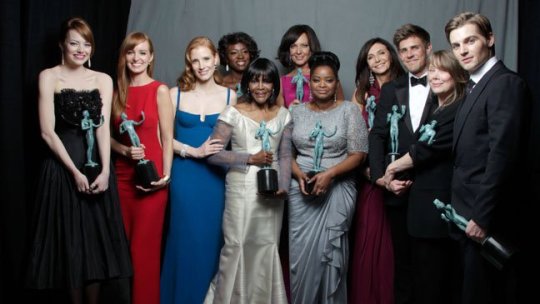
Touchstone Pictures released The Help worldwide, with a general theatrical release in North America on August 10, 2011. The film was a critical and commercial success, receiving positive reviews and grossing $216 million in worldwide box office. The Help received four Academy Award nominations including Best Picture, Best Actress for Davis, and Best Supporting Actress for both Chastain and Spencer, with the latter winning the award. The film also won the Screen Actors Guild Award for Outstanding Performance by a Cast in a Motion Picture.
The Directing and Filming
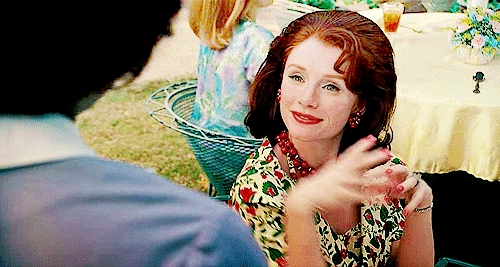
The film is a historical period drama set in Mississippi. The setting looked realistic and it looks as if the movie was straight out from the 1960s. The costumes, the hair, even the television and other background props really encapsulated the time period. It was visually stunning. The transitions were on point. It was an immersive experience that really took you to the 60’s and I can’t see any flaws when it comes to the filming of the scenes.
Each frame meant something. Every scene was necessary in telling the story. An example would be the scene wherein Skeeter and Constantine, her family maid who happened to just disappear, were having a conversation about the school dance and how no boy has asked her yet. They were talking beneath a huge willow tree.
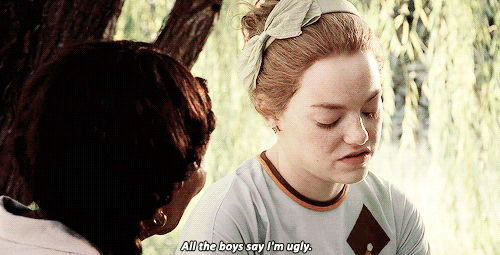
In this scene, Constantine and Skeeter feel safe under the shade. It shows how they are free to have a conversation there because they are hidden under the tree and no one else could judge them. This scene also shows how Constantine was more of like a mother to her than her actual mother which is a common theme in this movie.
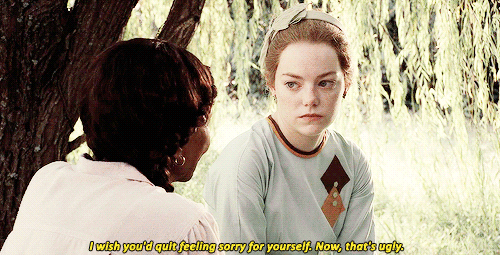
The maids seem to know far more than the mothers of the white children they take care of. They motivated the kids and made them feel important.
The Characters
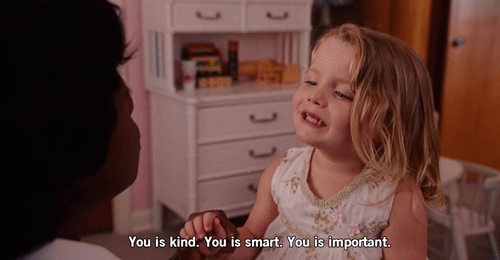
“You is Kind, You is Smart, You is Important” a significant line in the film said by Nanny Aibileen Clack. She says this to Moe Mobley, the child of Elizabeth, her boss. The character is seen to be taking care of the child even better than her actual mother.
The white women are seen as snarky and oppressive to their maids, but not all of them. Some have good stories and treat them well like in the case of Celia Foote –– who has never once hired a maid before. Minny becomes her maid and helps her in cleaning and cooking for Celia’s husband Johnny.
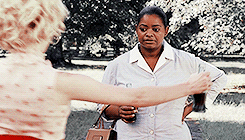
Celia is seen as an outcast because she comes from a trailer park community. People who come from that and suddenly get into the suburban lifestyle because they married a guy whose lifestyle is white, rich, elite often get shunned because they are seen as “white trash”.
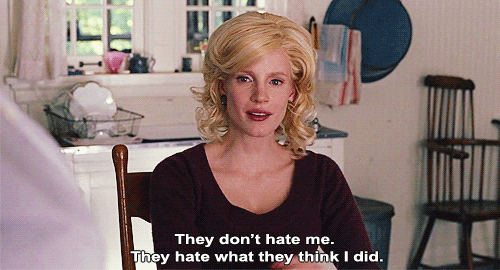
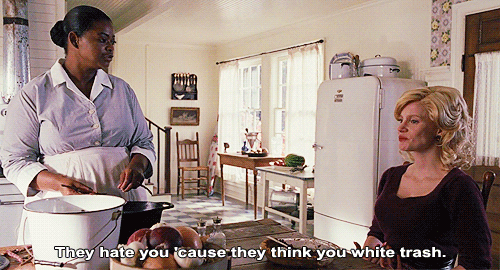
This is seen when the ladies pretend to hide and turn off the music when Celia knocks at their door carrying a pie that Minny made.
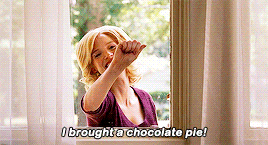
I especially enjoyed the dynamic between Minny and Celia. It was sweet and serious at times. It showed that not all white people are bad, some were allies and good hearted people just like Skeeter and Celia.
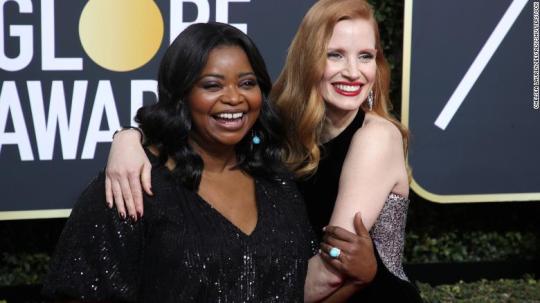
The acting was believable and convincing. None of the characters seemed flat to me, everyone had character development, some stayed the same like Hilly Holbrook but as an antagonist, she did her job of being hated and despised.
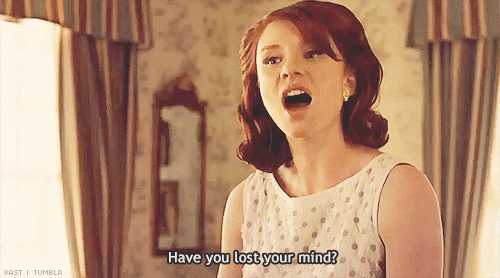
Skeeter’s mom was another character I thoroughly enjoyed. Her journey throughout the film really made a good character story arc. At first we find out she has cancer and she wants Skeeter to get married and find a husband quick. Forcing her to go on dates and getting excited when Stuart came looking for Skeeter.
But she ignores Skeeter whenever she asks about what happened to their maid Constantine. She’s unsupportive of what Skeeter is writing about at first, turn off the television when the black servants and Skeeter were watching national news about the Civil Rights movement telling her to not inspire them or give them any ideas.
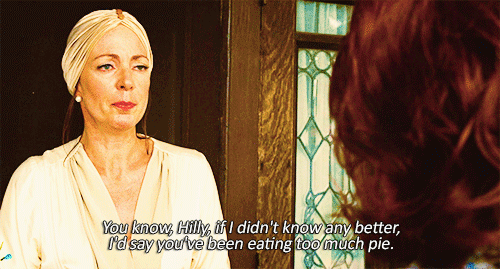
She has a change of heart in the end and reveals what happened to Constantine and ultimately becomes a supportive mother even defending Skeeter from Hilly who barges in their house threatening to ruin Skeeter’s life.
I enjoyed the strong female characters and the dynamic between all of them. The dialogue was also very well-written and humorous despite the fact that they are talking about racism, they still have some good comedy in there.
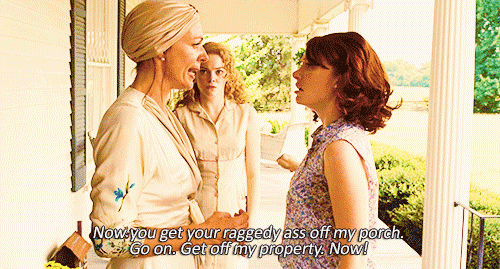
The Historical Context and Message Behind the Film
The stories that the Black maids told Skeeter for her novel revealed that the Jackson society at that time was very racist. The maids were unappreciated by their white employers as well as disrespected in the manner in which they were treated. The wages that they were paid were deplorable when compared to the work that was assigned to them. They were the ones that raised their white employers’ children without the input of the parents. This was despite the fact that the Blacks were considered dirty, lazy, disease–ridden and having less intelligence that the average white person.
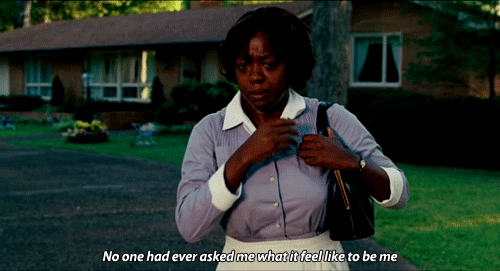
Unfortunately, the film falls short of a credible presentation, as the reality of the situation is not tackled with any degree of seriousness. One of the most jarring elements is the absence of any reference to the mass struggles that shattered the Jim Crow structure –– which was the the name of the racial caste system which operated primarily. Jim Crow was more than a series of rigid anti-black laws. It was a way of life.
There were several area within the movie that describe how life was really like in Jackson was like.
There is a scene in the movie where Aibileen was in the bathroom, built specifically for her because Hilly says that black people are disease-ridden and should have separate bathrooms. In several scenes of the movie, the mothers tell their child to not go to those “dirty” bathrooms used by maids or else they will get sick.
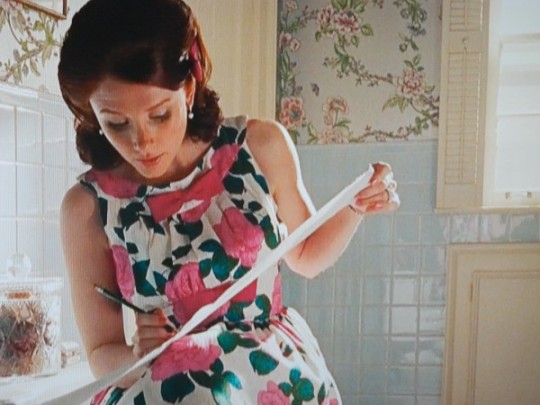
The segregation of bathrooms was so real that in the first scenes of the movie we see Hilly putting pencil marks on the toilet paper in the bathroom to make sure that Minny wasn’t using her toilet.
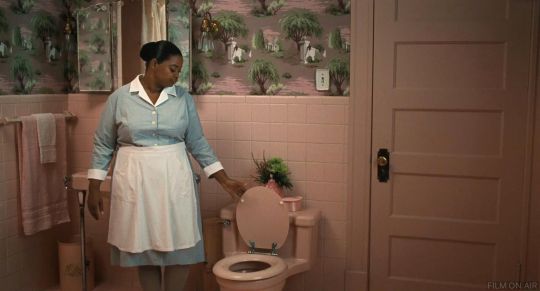
The maids travel on buses that are for black people only or are at the back of a bus with the white people at the front.
This is similar to the situation back then where everything was separated. Similar to an apartheid in South Africa. Wherein, blacks could not attend the same schools and churches as the white people.
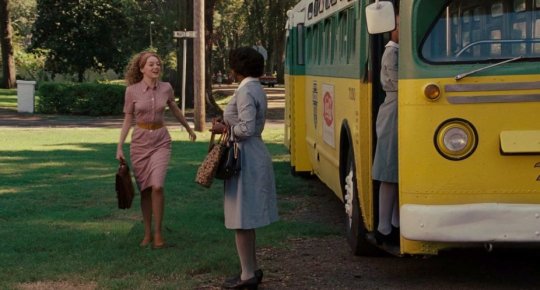
“They killed him” –– Aibileen tells the story of how her son died and explained that the white bosses loaded him up in the back of a pickup after being ran over. They dropped him off in front of the colored hospital, honked the horn, and drove away.
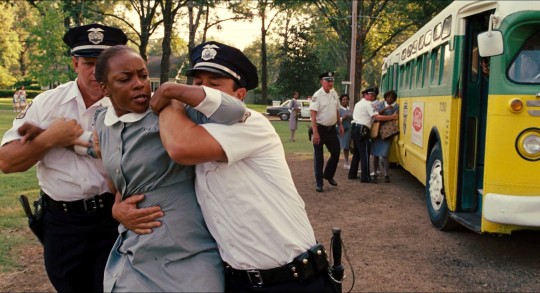
Also, a scene where Yule Mae gets arrested in a violent way and the white folks just watch and act as if nothing happened.
The movie shows some issues of discrimination and segregation but in my opinion it was a bit sugarcoated. Sure it can teach people about how life was like back then for African American but it does not show how bad it really was. It was violent, abusive, oppressive and frankly it was not funny. It could have done more but truth be told, the message was there and it did a great job of portraying it even if it was kind of stereotypical and whitewashed.
Whitewashing in a sense that Skeeter is seen as the hero and the brave one. Well she was brave but is it really appropriate that we are applauding this courageous, fictional white gIrl?
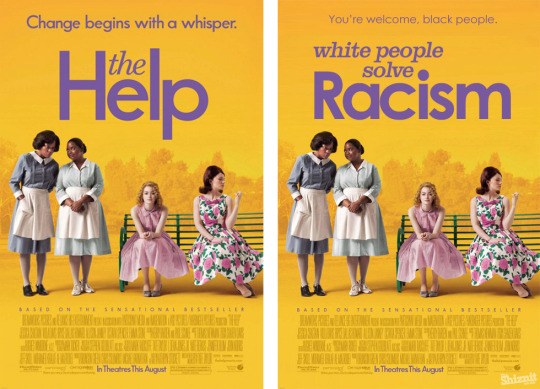
Truth be told it is fiction and it is meant to entertain but millions of people saw this film and might believe this to be real and an accurate representation of who were the real heroes of those times. It was a combination of black people who fought for their rights alongside white allies.
It’s not a perfect film, of course one movie cannot represent the vile actualities of the racism experienced by Black people during that time. In fact, this movie could have done more but chose to play it safe. Given the theme of the movie which is Racism during the 60’s, it’s a heavy topic that carries a lot of historical weight around it.
It could have been a more hard-hitting drama that would have made viewers bawl their eyes out after the film but like I said, it is a heavy topic to deal with. The writers and directors chose to make it light-hearted and easy to take in. It is told in an accessible and pleasurable way that almost anyone of all ages can watch and enjoy the film.
Do I recommend everyone to watch it? Yes. Do I think people should just stop at this film and use it as their basis for historical context on racism in the 60s? No.
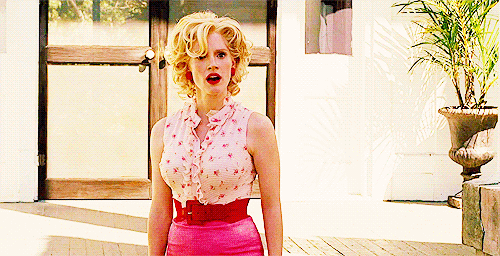
Did I enjoy it? Yes, very much so.
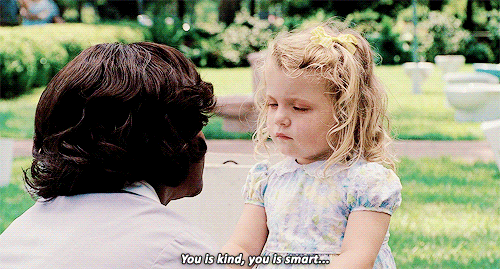
16 notes
·
View notes
Text
Myrgh’Or
So, after four years of world building, I’m publishing it, so you can use it, or suggest me anything. This is a constant work in progress, and reflects how I see it today. For my world, I have numerous sources of inspiration, including obvious ones like Terry Pratchett or John Ronald Reuel Tolkien, Homer, George Raymond Richard Martin’s work, or artworks like Skyrim, Tales of Symphonia, Dishonored, or other myths from Greek and Scandinavian mythology. It is not plagiarism, it is pastiche. Keep in mind English is not my mother tongue, and some grammatical mistake can and will appear.
I The World
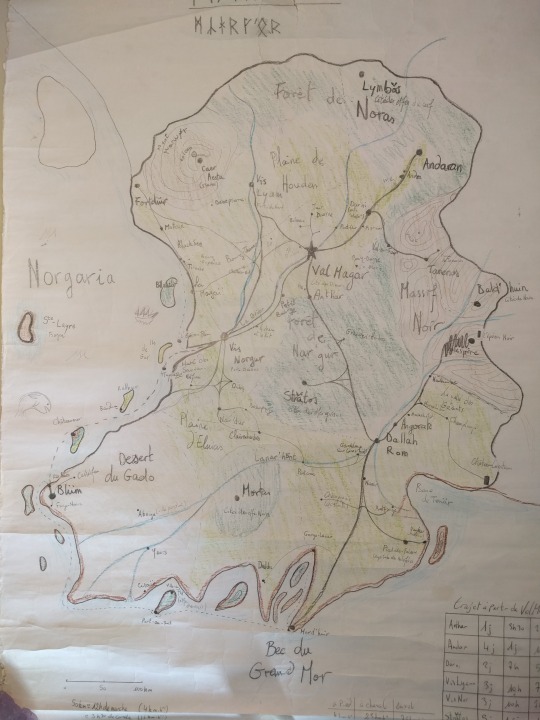
Myrgh’Or is a continent, on a back of a giant Tarasque, the Terrasque. It turns around it self, giving nights and days, and revolves around a star, giving the years. Each year is divided in 12 months of 4 weeks each. Each week is divided in 5 days:
Dyddwaz
Kraendydd
Nordydd
Visdydd
DyddMor
Each days is named after a major divinity, which we give more detail in the next section.
Most of Myrgh’Or has a temperate climate. It gets warmer at the very south near the Great Mor’s Beak, and dry in the south-west in the Gado Desert. Temperatures can go very low near the Black Massif on the est, and Mount Caer Estae north-west. Except for the Gado Desert (which is due to a singularity in the Terrasque), the continent has green plains and large forests.
II The Mythology and Folklore
Before the age of the mortals, were the Thamerians, powerful magical creatures. They built an entire empire across the back of the Terrasque, leaving ruins and foundations of the major actual cities. Resourceful as they were, they built machines to help them in they everyday life, more and more sophisticated. At first, those machines were made out of metal, powered by energy cores (brilliantly called thamercores) but they improved their techniques and began making creatures made out of flesh and blood. But they were fragile and imperfect, as they didn’t last long, so the Thamerians, and especially one, called Vissaus, kept improving her creatures. Thus were created the humans, elves, and other task-specific creatures such as the dwarfs and the haffling. His dear friend and rival Kraenn thought they were too complicated for their purpose, and took inspiration to make the fauna, from the smallest fish to the greatest dragon, in order to help keeping the flora that had emerged from the back of the Terrasque, viable, and the fauna in a delicate balance. When any creature was broken (or dead) one of them: Mor, would take it away, giving it to Vissaus or Kraenn again.
Some tensions were built between the Thamerians, that eventually lead to war. Many Thamerians perished, and the survivors gave freedom, wisdom and knowledge to their creatures before leaving the continent. They were lead by Waz’kry, his brother Mor and his lieutenants Nordyr, Vissaus and Kraenn. They were eventually raised to the status of gods by the remaining population.
However, not every Thamerians were approving this liberation, and took revenge on this humiliation by attacking and tormenting the mortals. Nordyr help them, by giving them weapons to defend themselves against Naard’s assaults. When a more stable peace was achieved, they eventually went to the head of the Terrasque, minding their own business, while sometimes sending avatars to meet with the mortals, often from the creation of Kraenn, or Vissaus.
Waz’kry became the god of the gods, patron of justice. His avatar is a phoenix.
Mor became the god of death, and took the nickname “the Great Mor”, taking away deceased creatures when their time has come. His avatar is a pale humanoid that morphs into a crow.
Vissaus became the goddess of knowledge, arts and science. Her patron is also a humanoid, helping mortals solving problems.
Kraenn became the god of nature. His patron is a deer, guiding lost persons.
Nordyr became the god of war, travelers and merchants. His patron is a grey wolf.
Other Thamerians were also elevated to gods, among them: Tralunac, god of chaos, Naard, god of destructions, and other.
III History of the Mortals
Before leaving, some of the Thamerians left behind creatures of their own as a legacy, becoming Celestial beings and Tieffling, perceived as half-gods. Some of them, such as Hippolyte Waznal, son of Waz’kry, and his cousin Mornal were called to rule over the other mortals, making Waznal the emperor of Myrgh’Or, and starting the first era.
The calendar counts four eras so far. The first era starts at the foundation of the empire at its former capital city Vis Lyann ; and ends and year 317, during the revolt of the half-elves. As they were too human for elves and to elven for humans, they were segregated, until things went out of control. They founded the independent city of Skysod, on a low hill to the west of Vis Lyann, while the other mortals went south to the city of Val Magar, making it the new capital of Myrgh’Or.
The second era ends in year 553, by the end of the siege of Blüm, in the Gado Desert, that was independent city so far. In the same time, the half-elves of Skysod surrendered and accepted a peace trade with the empire. Those two cities would still have their own government, but be under the guardianship of Val Magar.
The third era ends in year 1072, when Theophrastus Mornal, son of the Great Mor, kills the last dragon, after almost 1500 years of crusade, to prove to his peers his valor and power. Some say that the dragon wrath first came from him, but it was this wrath again other mortals that lead Theophrastus on his killing spree.
The fourth and current era is now at 92 years of relative peace, even though about 50 years ago, the son of Theophrastus, Seth Mornal wanted to do as his father and began a cult to kill all lizardfolks (the Saurians) and Goblin. (He wanted to kill orcs as well, but they were to strong for him). He eventually got stopped quickly by the imperial armies, but many suffered from his insane crusade. This came from a long time racism from humanoids against other thinking creatures, especially from the Haffling toward the Saurians.
IV Geopolitics
IV-a Governments
The contient is divided in six regions, with their own capital. The first is the region of Val Magar, in the center of the continent, and heart of the empire. Up north, there is the region of Vis Lyann, city of the archmage and the paladins; west Vis Norgur, great harbor and gateway to Blüm; south-est Dallah Rom, important economic city, at the crossroad of the north and south; south Strâtos, city of the Grey Elves; and south-west Blüm, formerly independent. Skysod is in the region of Vis Lyann.
Each region has its own leader, its Thael, often chosen by the emperor, or first offspring of the last late Thael; except for Dallah Rom, were the Thael has been overthrown by the local bourgeoisie and installed an elected government.
Each Thael (or equivalent, looking at you Dallah Rom) has its own army, but has to respond to the Empire. However, any military title from the empire is treated one rank under when dealing with local army. For instance, a sergeant of the imperial army will be considered as a corporal in any other army. This is to prevent abuse of power between the imperial armies and the local armies.
Every town has their color scheme and symbol. Val Magar is a silver tower, with two swords crossing in the background. The tower represents the emperor’s tower. Vis Lyann is a golden tower, with a green shield in front. The tower is the former emperor’s tower, now the paladin’s academy and archmage’s tower. Vis Norgur is three bronze manatees in top of each other, on a blue background. Blüm is a golden kopesh, with red gems on the side on a bronze background. Dallah Rom is an ox with dagger for horns, in front of a green background. Stätos is an eagle-owl with a scroll in its claws, over a marine-blue background. And the Empire is a flaming phoenix, over a red and silver background.
IV-b Villages and other cites
Each city has its own local government, of a mayor, chosen by the Thael, and several councilmen or councilwomen, chosen by the mayor.
Folks of the same races tend to gather into communities, forming cites. Lymbôs, in the Vis Lyann region and in the Noras forest, is mainly populated by wood elves. Bald’huin, in the region of Dallah Rom, in the Black Massif, is mainly populated by dwarfs. Mortas, in the Mortas forest, in the region of Stâtos, is mainly populated by dark elves and night elves. They are lead by the Spider clan and the Raven clan. Hillfoot, on the south cost, in the region of Dallah Rom, is mainly populated by Hafflings. Illpit, on the west cost, in the Vis Norgur region, is mainly populated by Saurians.
Few smaller scalled cities are famously known for very specific things. For instance, Ompolinburgh produces the best horses of the continent. They have this knowledge from a nomad tribe of tattooed elves, that once had a settlement here, and leaved when other races came. The city of Hillfoot, where most of the Haffling live, are famous for their racist chocolate, the Saucolote, with a smiling saurian on the package, and their raciste pipe weed, the Sanabis. The village of Littleburgh is known for having only small sized dwellers, such as dwarfs, hafflings, or just small humans. And Thamerburgh is known for its ruins of thamerian civilization next to the border of the city.
V Miscellaneous facts
Raptor breeding is very prolific in the Elnias plains, on the west of the continent
Giants live in the south of the Black Massif, and it is bad luck to watch one in the eye. This doesn’t prevent people reproducing with them, making some curious hybrid.
The true half-elves (human-elf) are the only fertile hybrid of the Terrasque, all the other are sterile, but are still viable.
The closer you are from the elven race, the higher you are in the half-elf hierarchy.
The other son of Theophrastus, Garius Mornal, has accidentally woken up sleeping dragons that his father didn’t kill. They are now trying to regain strength
Tralunac is one of the only gods to actually interact with mortals, instead of using an avatar.
The cult of the Great Mor has significantly lost interest when his grand son tried to make a genocide. It has gotten a bit better since
Even if it is technically a mortal, the emperor hasn’t aged since the first era, making him the longest (and only) ruler of Myrgh’Or.
His cousin Mornal, and brother of Theophrastus, hand of the emperor, has been killed during the thrid era, and being replaced by Crowback, as the hand of the emperor. His name comes from the people of Val Magar, since everyone knows he ordered the assassination of Mornal, but no one can prove it.
Many guilds and organisations emerged from the society. Among them, the Silver Skull, an adventurer’s guild in Val Magar, lead by Garius Mornal, or the Black Feather, an assassin guild, lead by... also Garius Mornal. In Blüm, there is the Sand Dagger, an illegal guild, lead by Âhz-Ra, and all across the continent strikes the Alleged, who take care of problems they value worth the time.
Even if magic does exist, there is always a risk of becoming mad by using it, slowly corrupting the mind.
Some people are specialists in the making of special orbs, that come from the soul of any living being. The greater the soul is, the more powerful the orb will be. For instance, using an ox will strengthen the wielder, while using a orb from a Hag will boost the intelligence but also slowly corrupt the mind of the user, like using magic.
Many races, like orcs, goblins, or ogres, are nomads, and can be found anywhere on the continent. Even if they come from the same origin, they are mistrustful toward each other.
The personal guards of the emperor is constituted of Drakes that agreed to help him. For that, they have been banished from their clans.
[meta] The world is constantly evolving, as we are four DMs playing, using it as a canvas. Some cities appear, other are being destroyed. I have much more to say, but not all is relevant. Feel free to give me any feedback you seem useful, and I hope you enjoy it as much as I do.
Keep playing,
Jules, the game master that loves you.
121 notes
·
View notes
Text
Time For a Writing Break
It really kills me to say this, because I swear, if I ever go more than a month without publishing something, I will always get at least one comment saying “Oh damn, I thought you were dead!” or something, always always always without fail. I get that people don’t mean anything malicious by it, but I do find it a little irritating that people think that if I’m not publishing something weekly, that means I’m gone for good. No, it’s not, it’s just that I take a lot more time than other fic-writers do (which doesn’t seem like they take a lot of time in the first place), and I also sometimes need to push writing aside because of school. Really frustrating, but that’s the way it is sometimes.
My plan is to step away from my stories for the rest of this semester, and once I’m done with finals, to get back to it immediately the day after. And the next story I want to do is one focusing on James Hopps Jr., Nick and Judy’s son. I’ve only used him twice in my stories, one SFW one Explicit, and I really do want to develop his character a little more past “Nick and Judy’s son”. So, that’s the next story in the agenda.
As for the story after that? That’s up to you guys. Yup, it’s Strawpoll time! However, things are gonna be a little different. You’re getting not one, not two, but THREE different polls, each with a different selection of stories. One of them will be Zootopia stories, the second will be MLP stories, and the third will be Misc. stories. I’ll give you a list of the story descriptions and the links to the polls after the read more break. The way this is going to work is, you’ll vote for one story in each category (unless you have no interest in the other categories, then just vote for the ones that you do). At the end of November, I’ll pick the winner of each category and make a final strawpoll to pit the final four against each other to see which one story you all want me to write most.
Also please be aware that most of these are working titles and will most likely be given better titles upon final publication
Zootopia Stories
Nick’s Daddy Dilemma (Teen/Drama/Heartwarming)- After several months of marriage, Judy drops the mother of all bombs on Nick when she asks him how he feels about being a father. Instead of demanding a decision on the spot, she gives him time to think about it, which prompts Nick to spend their day off by himself so he can think it over in privacy. Nick explores various attractions of the town while mulling over the idea of fatherhood and if it’s something he’s cut out for or not.
Fox Muzzle Jacket (General/Comedy/Inspirational)- Months have passed since Nick submitted his application to the ZPD, and the academy training has finally begun. Despite his best effort, Nick just can’t seem to keep up with his fellow cadets. Just when he’s on the verge of calling it quits, he finds inspiration through the best friend he has to never give up and never give in, til he reaches the end.
Sly But Sincere (General/Romantic/Hurt-Comfort)- Olivia Pawford is a junior in college who’s just trudging along without much hope for the future past being more than what her family has raised her to be: a sly fox getting through life by deceiving others. She’s surprised to meet a man named James Wilde, a fox who’s driven to find a different path than other foxes, an honest path without any trickery or dishonesty. After spending an extended time together, the two find out that they might be in it for the long haul regarding their lives together. But does fate have other plans for the happy couple?
I Will Find You (Mature/Action-Adventure/Strong Bloody Violence)- Nick and Judy’s son James has been kidnapped in broad daylight without anyone noticing. The worried parents receive a call from an anonymous voice hours later, demanding they pay a ransom they can never afford if they want to get him back alive. Rather than give into their demands, Judy decides she’s going to get him back through her own methods: no matter how much blood she has to spill along the way.
Zootopia University (General/Romance/Angst)- James Hopps has finally moved out of his parents Nick and Judy’s house and begun his college career majoring in law. While the mountain of work he’s faced with seems intimidating, a lion by the name of Felicia Felis majoring in psychology takes it upon herself to help the poor freshman get his head in the game and keep his head above water. The two find ways to help each other out as the semester continues, and as their relationship grows, James figures out Felcia can read him like an open book. What surprises James the most is how comfortable he is with that knowledge in mind.
Meet The Hopps (General/Drama/Family Spats/Segregation)- After neglecting it for so long, Judy decides it’s finally time to introduce Nick to her parents as her boyfriend. While Bunnyburrow is known to maintain a conservative view against interspecies relationships, Nick is determined to give the impression he can to Judy’s parents and her siblings. Will Nick’s good intentions change the minds of Judy’s parents, or has their traditionalist mindset been reinforced for too long to see a different point of view?
It Runs In The Family (Explicit/Fluff/Incest/Threesome)- After finding out that their growing son James has been spying on them, Nick and Judy have a talk with him about how he needs to respect their privacy.It’s revealed that James has been harboring a lustful attraction to his parents, which plants all sorts of visuals in his parents heads. Nick and Judy have a talk amongst themselves about what’s the morally right thing to do about this, and what real harm would be committed if they gave their son what he willingly wanted.
The Naked Truth (General/Comedy/Awkwardness/Slice-of-Life)- Just a few months after Nick has been admitted into the Zootopia Police Department, they receive a tip about an underground crime ring that could help bust a longstanding case wide open. Unfortunately, the informant will only give them the information in detail if they agree to meet at the Mystic Springs Oasis. Nick has no issues letting the warm oasis air rush through his buff fur along with all the other nude animals. Judy however is not so comfortable in her birthday suit. Things are made even more awkward when Nick runs into an old ex-girlfriend of his who seems all too eager to see him again.
ZootopiaxKingdom Hearts (Action-Adventure/Drama/Comedy)-Sora and company find themselves in another world along their journey, and Sora himself sees that the magic of the world has given him a new form to fit in with the rest of the citizens. The Heartless have been terrorizing the city, and a number of predators have been goingmissing over the past week. The trio teams up with Officer Hopps and con fox Nick Wilde to unravel the mystery of who’s controlling the Heartless and if it’s connected to the vanishing predators.
Wilde Family Stripper Club (Explicit/Comedy/Incest/Awkwardness)- after turning in his ZPD application, Nick finds out that his heroism in saving the city has ruined any chance he has of going back to the street hustling life. With no other skills of merit to land him a job to pay the bills before the academy training starts, Nick swallows his pride and applies to be a dancer at a fox strip club. He’s hired on the spot, but the manager has neglected to tell him that there’s another fox he knows working at the joint, a vixen he’s known for literally all his life. Things are gonna. Get. Weird.
A Bun In The Oven (Explicit/Comedy/Fluff/Pregnancy Sex)- Judy is eight months pregnant, and her stomach is the size of a volleyball. She may not think it, but Nick thinks she’s just as beautiful as ever. Once their clothes are off, Nick just can’t get enough of Judy’s big round belly carrying their child, and every touch Nick gives her sends Judy into levels of arousal that she’d not thought possible.
Taking The Reigns (General/Comfort/Getting Old)- Nick and Judy have been serving on the force for almost two decades now. Chief Bogo’s getting ready to retire, and wants Judy to be the one to take control of the department in his stead. Judy would rather stay an active officer instead of sitting behind a desk and dealing with politicians and paperwork, but she has to face the truth: her passion might be as fierce as ever, but her body isn’t quite what it used to be. Maybe it’s time for a change in scenery, even if she’s still working in the only place she ever wants to work.
No One I’d Rather Be Caged With (Teen/Drama/Hurt-Comfort/Romance)- Following the arrest of Mayor Lionheart, the two night guards Gary and Larry are sentenced to prison. Luckily for them, they were assigned the same cell, but now the two will have to face the horrors of life in the slammer for a year at minimum. When things seem at their worst, the two wolves will find their already deep bond runs deeper than the two ever imagined.
Place your vote here
My Little Pony Stories
The My Little Pony Friendship is Magic Movie: But It’s Completely Self-Aware (Comedy/Random/Meta-Humor)- Let’s cut the bullshit: Hasbro has an agenda, works by a formula, and in this particular universe, everypony knows full well how things work. Enjoy a retelling of the MLP movie with characters regularly pointing out cliches, plotholes and overalls flaws of the movie they have no choice but to take part in.
Chaotic NightBreaker (Explicit/Bondage/Threesome/Comedy)- following Discord’s crazy night with Celestia’s fiery alter-ego, the princess of the sun asks him if he’d be up for a similar experience, but with the addition of another participant. The two talk it over with Princess Luna, who seems hesitant at first to tap into her inner darkness, but after learning that Celestia could do it briefly and return to normal when they were finished, she thinks it’s worth a shot. Discord is in for one hell of a night when the princess of day and night let their wicked sides out to play, and make Discord their submissive plaything for the evening.
Sunset’s Horseplay (Expliicit/Fluff/Interspecies Sex)- (yes, everyone’s already done this idea and I’ve missed the bandwagon years ago). Though Sunset Shimmer has grown accustomed her home in this new world and found a place among wonderful friends, part of her still misses the land she came from. She finds comfort in spending time with Boxer, one of Applejack’s farm horses. What she begins to realize though is that she’s yearning for something more from Boxer, something to satisfy the curious itch within her and make her feel like what she was before she stepped through the mirror in Celestia’s palace.
Garbled Emotions (Explicit/Drama/Hurt-Comfort/Awkwardness)- Garble and Fizzle have been best bros for years. When they’ve reached the proper age, all the dragons are looking forward to their first battle for their place at the top of the mating ladder - all except Fizzle that is. As time goes by, Garble begins spending more time than usual with Fizzle, learning he’s growing less content with his place among dragonkind. Garble will have to dig deep to figure out where his true loyalty lies: with his species, or with his closest friend.
Moonlit Melancholy (Teen/Romance/Sad/Hurt-Comfort/Recovery)- After Twilight helps Moondancer confront her depression and pick up the pieces of her life again, the princess of friendship begins regularly checking in with Moondancer by using her magic to talk with her through her books. After some spontaneous flirting, the two decide to take things to discover they have a bountiful amount of things in common. Despite their joy over their new relationship, Twilight’s obligations as a princess make it hard for her to regularly spend time with Moondancer. They’ll be able to tough it out and find a way to make iit work, right?
A Dwindling Flame (Teen/Drama/Sad/Hurt-Comfort)- Soarin has noticed something’s changed about Captain Spitfire over the past year. Whereas she used to be calm, cool and collected, she’s become more tight-wound and abrasive, plus her loyalties haven’t been as clear as they used to be. Soarin confronts his captain about what’s going on in her life, and realizes it might have to do with the newest rainbow-maned recruit to the Wonderbolts.
Love Measure in Scales (Explicit/Romance/Drama/Love Triangle)- A story I started YEARS AGO and haven’t touched in forever. I still have the missing half of the story outlined, and could be tempted to start work on it again, if enough people still care.
Place your vote here
Rick and Morty Stories
MortyxMolly (Explicit/Romance/Comedy/Hurt-Comfort/Selfcest)- While completing a mundane task in a secret quadrant of the infiniverse, Morty meets a version of himself that he’s never encountered before: one lacking a Y chromosome. Molly is just like Morty in so many ways, even with an alcoholic grandmother named Rita. Rick tells Morty that getting involved with a version of himself from another universe is one of the worst ideas someone can imagine, but Morty and Molly are driven to prove that the person they’ve been waiting for all their lives was themselves.
Morty’s Dino Lap Dance (Explicit/Comedy/Big Dino Stripper Butt)- While his grandfather effortlessly resolves the Israel-Palestine conflict, Morty finds his attention occupied by a large and busty stripper behind their seat. Morty’s never thought himself to be attracted to dinosaurs before, but something about this woman captivates Morty to the point that he wants a private dance with her. Rick does what any responsible mad scientist grandfather would do: give him a pocketful of money and tell him to enjoy himself some Jurassic Juggs.
Incestual-Dimensional Cable (Explicit/Comedy/Incest/Angry Sex With Fluff At The End)- When Rick passes out for an extended amount of time and Beth is called away to perform emergency horse surgery, Morty and Summer decide to watch some good old Interdimensional Cable. While surfing channels, they stumble across a porno with themselves as the actors, having intercourse with full knowledge that they’re related. Even after turning the TV off, the image still sticks in each siblings mind, pushing them to entertain the idea of imitating what they saw on TV.
Place votes here
Undertale Stories
The Goat Trap (General/Comedy/Drama/Amending Fences)- even though Frisk and Asriel get to spend a fair amount of time with Asgore, it’s clear that Toriel still holds a grudge against him. Asriel knows they aren’t getting back together, but he at least wants them to get along. With the help of Alphys, Frisk’s friends manage to set up a trap that locks Asgore and Toriel in the same room, saying they aren’t coming out until they talk things out and form a truce of sorts. Will the two goats find a path to peace between themselves, or are they too far gone to find a compromise?
Blossoming SOULS (Explicit/Fluff/Interspecies/Delicious Goat Boipussi)- When mom is away, the boys will play. Toriel leaves the house to run some errands, and young teens Frisk and Asriel decide to have some fun while she’s gone. It’s delicious young human-goat monster sex, what more could you ask for?
Place votes here
17 notes
·
View notes